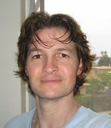Brian D. Stephens's Blog
December 2, 2019
Spiritual Practices List
Learn profound spiritual practices that will enable you to still the mind and draw closer to the divine. The list of spiritual practices is followed by a description of each practice.
List of Spiritual Practices
SpaceTransitioningBeing the ObserverFocusing on the Energetic BodyImmersing Yourself in NatureMeditationTraining the MindFocusing on the BreathStanding and Walking MeditationConsciously Experiencing UnityIntegrating Meditation into Your PathChoosing a Meditation Technique and TeacherMantrasOm MantraThis MomentBeing What You Already AreSelf-EnquirySurrenderPrayerAligning with Daily Energetic ShiftsVisiting Holy PlacesSelfless Service
DESCRIPTION OF EACH SPIRITUAL PRACTICE
Space
Space is a way of describing the universal consciousness
that sustains creation. It is everywhere. Yet while under the ego’s influence,
people are unaware of it.
In the external world, they focus on objects and not the
space in which the objects exist. Internally, their attention is consumed by
thoughts. They are oblivious to the space (or consciousness) that enables them
to perceive reality.
Space can act as an opening into the formless. Focus on the
space you perceive in the external world or that you feel within. Your thoughts
will gradually subside as you become immersed in an all-pervading stillness.
Transitioning
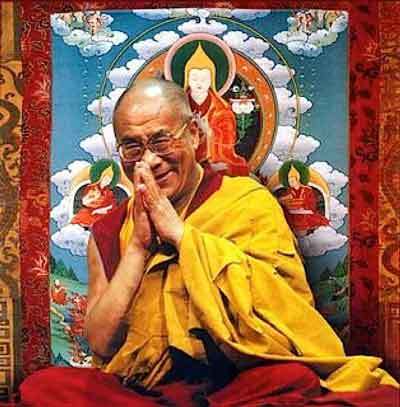 Dalai Lama teaches the importance being conscious while transitioning between various life experiences
Dalai Lama teaches the importance being conscious while transitioning between various life experiencesYour internal and external reality is constantly changing.
There are always new forms, whether they are thoughts or external objects, to
capture your attention.
Between different experiences there is a brief interval between
one thing ending and a new one beginning. When one thought ends, there is a
moment before the next thought begins. When you stop looking at one object,
there is a pause before your attention rests on another object. When you
complete a task, there is a break before you start something else.
Within the intervals, your attention is no longer captivated
by the world of form. But the intervals are so fleeting that they are usually
overlooked. By intentionally focusing on them, you can connect with Source.
After you learn how to connect, discipline yourself to
maintain that state throughout the day, regardless of what is happening in your
internal and external reality. Do not allow the ego to lose itself in one thing
after another. Instead, transition from one moment to the next while staying in
touch with the deeper truth.
Know the pure state, your own real nature, by keenly observing the interval between two thoughts.
— Muruganar
Being the Observer
God is simultaneously each of the life forms within creation,
immersed in their own reality, and the infinite awareness that observes and
guides creation. Be the observer. Withdraw your attention from your life
experiences so that you can align with your own infinite nature.
Take a mental and energetic step back from what is
happening within and around you. Notice thoughts arising in your mind without
allowing them to grab your attention. Watch and listen to the external world
without mentally describing what you perceive. Be there as the witness of your
life instead of being caught up in what is happening in your life.
Focusing on the Energetic Body
The energetic body gives life to the physical body. Focusing
on it moves your attention inward and gradually stills your mind, so you can perceive
the formless unity.
Start by sitting quietly. Place your attention on different
parts of your body. What you feel when you are not moving is the energy that
sustains your physical form. Then expand your awareness to include the entire
energetic body. Hold your attention there and eventually the formless level of
reality will reveal itself.
There are meditation practices that move energy through
different parts of the energetic body, such as the chakras and meridians. These
practices can lead to unexpected shifts in your energetic form that adversely
affect you, both physically and psychologically. Learn meditation and energy movement
practices from an enlightened
teacher, so you don’t become unnecessarily delayed in your spiritual
development.
Immersing Yourself in Nature
Nature exists in harmony with the divine. Trees, plants,
and animals don’t have fully-developed egos to impede their connection with Source.
Through nature, many seekers are able to perceive the
deeper reality for the first time. Take a walk in the woods, in a field, or by
the ocean. Allow yourself to be enveloped by your surroundings, and you will
discover the formless that is hiding just below the surface of every form.
Civilization is a physical expression of the ego. Try to go
somewhere each day that is free of human influence and the countless distractions
of modern technology. Go to a place where the simplicity of nature frees you from
the thinking mind.
Meditation
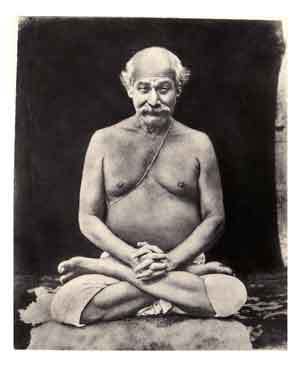 Lahiri Mahasaya taught the meditation practice of kriya yoga
Lahiri Mahasaya taught the meditation practice of kriya yogaMeditation is a popular practice for gradually
stilling the mind and connecting with Source. Seekers have varying degrees of
success with meditation, depending on the technique they use and their current
level of spiritual development.
There are many different meditation techniques taught by Hindus and Buddhists. For instance, you might want to try kriya yoga or self-enquiry, which I have discussed in other articles. In this section, I’ll describe what the various meditation practices have in common and how you can incorporate meditation into your spiritual path.
Training the Mind
For the beginning seeker, meditation is a tool for training
the undisciplined mind. When done correctly, meditation combines a heightened
state of awareness and tremendous relaxation. The mind remains balanced, less
inclined to be disturbed by arising thoughts.
Most meditation practices are based on concentration. By focusing
on a single thing, your mind is less inclined to jump from one thought to the
next and gradually quiets down. Then you can perceive the deeper truth.
Many seekers keep their eyes closed during meditation and
place their attention on an internal form. For instance, you may turn your gaze
to the sixth chakra, located just above the eyebrows, or silently repeat a mantra.
You may find it easier to keep your eyes open and concentrate
on an external object, such as a flower or the image of a saint. Focusing the eyes
gently, instead of staring intently, reduces the energy you project out into
the world and helps draw your attention inward.
Focusing on the Breath
Most of us are unaware of the air that is constantly
entering and exiting our bodies. By becoming conscious of your breath, you can
train your mind and come into alignment with the formless reality.
While meditating, feel the air entering your body on the
inhale breath and exiting your body on the exhale breath. When a thought arises
in the mind, return your attention to the breath, and allow the thought to fade
away.
The gap between breaths is an opening into Source.
Focus on the short cessation in breathing that occurs
between the end of the inhale and the beginning of the exhale, as well as between
the end of the exhale and the beginning of the inhale. As you do, you will be
drawn into the stillness.
Standing
and Walking Meditation
Meditation is most commonly practiced in a seated position.
Many seekers learn how to sit quietly in meditation and connect with Source.
Then they regress into unconscious behavior while carrying out the duties of
daily life.
Through a standing or walking meditation practice, you
learn how to remain focused on the formless while also participating in the world
of form. You learn how to integrate your internal and external life and remain
conscious throughout the day.
At first, you may find it challenging to stay in touch with
the deeper reality while your attention is also on the external world. Try to
be the observer, and perceive external objects without describing them
internally. If you find your mind wandering from thought to thought, focus on
one thing in order to still your thoughts. For instance, you can repeat a mantra
or focus on an aspect of nature.
While walking and meditating, live in the moment. The ego
always feels the need to go somewhere in order to do something else that is
considered more important than what is happening now. Be aware of everything
that is occurring within and around you as you take each step in the present,
instead of focusing on where you are going in the future.
Consciously Experiencing Unity
Both dreamless sleep and deep meditation enable you to
access the state of unity. During sleep, your life force ceases its normal outward
projection caused by the senses and retreats into the seven energy centers (or
chakras) along the spinal column. In the dreamless sleep state, all thoughts cease,
and your individual identity disappears into the
infinite. This periodic return to the Source of life is needed in order to
sustain the human form, which is why you feel so much better when you awaken.
The whole point of the spiritual journey is for you, a soul
under the delusion of separateness, to consciously recognize your own infinite nature.
While meditating, you are aware of your life force being drawn inward. You feel
yourself being immersed in the deeper reality, like a rock slowly descending to
the bottom of the ocean. When all sense of separateness falls away, you are
conscious of your oneness with Source.
Integrating Meditation into Your Path
Numerous enlightened teachers, such as Paramahansa
Yogananda and the Dalai Lama, consider seated meditation essential to attaining
liberation. Well-known enlightened teachings, such as the Bhagavad Gita and the
Yoga Sutras, emphasize the importance of meditation for a sincere seeker of
God. As a result, many people begin their spiritual journey by meditating.
Yet meditation is not necessarily a simple practice. Some
people are well suited for it and take to it easily. Others begin meditating
before they are ready and get poor
results. If you try meditating and struggle with it, perhaps you should focus
on other practices, at least for now. For instance, by taking a walk in nature
or being in the presence of a saint, you can learn how to perceive the deeper
reality. Then when you return to meditation, you may discover that you are able
to connect deeply with Source.
Choosing a Meditation Technique and Teacher
Not all meditation teachers and techniques are equal. Without
proper training, you may remain stuck at your current level of spiritual
development, regardless of how much meditating you do. Some people meditate for
years without learning how to escape the ego’s influence and align with the formless.
Learn meditation from an enlightened teacher. His grace and
insights will help you overcome obstacles in your meditation practice and
progress quickly along the path.
There are different approaches to meditation taught by
different saints. Allow your intuition to guide you in choosing a practice and
teacher that feels right for you. For instance, you may try kriya yoga (taught
by Paramahansa
Yogananda) or self-enquiry (taught by Ramana Maharshi) and feel drawn to one
approach over the other.
Mantras
Just like everything else in the physical world, the words
and sounds that you perceive are created from energy. Some words are formed by
energy vibrating at the highest, subtlest levels. By repeating them, your
energetic body gradually attunes to their vibration, and you come into
alignment with the deeper reality.
In the beginning, you may find it useful to repeat a mantra
out loud. With practice, repeating it internally provides the same spiritual
benefit. Eventually, you can learn how to attune to the energy of the mantra and
allow it to resonate within your system, without the words appearing in your
mind.
A mantra can be used anytime. Synchronizing it with the
breath during seated meditation helps to still your mind and draw your
attention inward. Repeating a mantra throughout the day enables you to stay in
touch with your deeper nature.
Om Mantra
Om is the original vibration that gives rise to everything
in creation. By repeating Om, your system attunes to the universal consciousness
underlying the perceived reality.
Meditating on Om is a simple and powerful practice
for any seeker, at any spiritual level. The beginning seeker can learn how to
train the mind. The advanced seeker can enter the state of unity.
This Moment
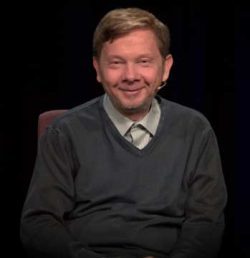 Eckhart Tolle’s main teaching is the Zen practice of focusing on the present moment
Eckhart Tolle’s main teaching is the Zen practice of focusing on the present momentAll of creation exists only in this moment. Everything
that happens always takes place right now.
Past and future have no independent reality; they
only exist as thoughts in the mind. The false self separates this one moment
into countless moments and creates the illusion of time. When some event occurred
in the past, it did so in the present. Whatever ends up happening in the future
will occur in the present. When you reflect on the past or consider a possible
future, you do so in the present.
The false self sustains itself by thinking about
something other than what is happening right here, right now. A time in the
past or future is perceived as more important than this moment.
The false self is often trying to get to some
future point when its desires will be satisfied and things will be better than
they are now. Yet the future never arrives. To focus on some imagined future
and turn your attention away from
this moment is to be lost in the thinking mind. You ignore your entire life,
which takes place now.
While immersed in thought, you are trapped on the surface
of life. Focusing on this moment stills your mind and reveals the deeper truth.
To align with your true nature, within this moment, start
by paying attention to what is happening within and around you. You may be
walking from one place in your home to another, or taking a drink of water, or
simply sitting in a chair. Let the experience be what it is without interpreting
what is happening through your mind. Feel what is happening without using
thoughts to comment on what is happening.
As you become immersed in this moment, thoughts arise less
frequently. You enter a heightened sense of awareness in which you engage the
world directly, without any interference from the thinking mind.
The false self will constantly try to recapture your attention
with a thought and pull you out of this moment. When you notice yourself lost
in thought, return your attention to what is taking place now that is beyond mental
description.
Experience takes place only in the present, and beyond experience nothing exists.
— Ramana Maharshi
Being What You Already Are
Right now, in this moment, your true nature is one with the
divine. From this deeper perspective, there is nothing for you to learn or do
in order to be what you already are. Only from the perspective of the false self
do you travel a spiritual journey from separateness to unity that spans a
length of time.
Let go of all the ideas you have unconsciously accepted
about yourself. They help to sustain the false self and the illusion of
separateness. You are not the mind or the body. Your life story is nothing but
thoughts in your mind. Your true nature exists independently of any ideas you
have about yourself.
Some saints emphasize the importance of not doing
anything in order to align with your deeper nature—just be. According to them,
enlightenment is not something you need to attain. You are that which you are
looking for.
The state of being is where all spiritual practices lead.
Yet it can be difficult to achieve. The false self does not willingly relinquish
its control over you. Many seekers find it easier to “just be” while immersed
in the divine light, which happens when in the presence of a saint or reading
an enlightened teaching.
Self-Enquiry
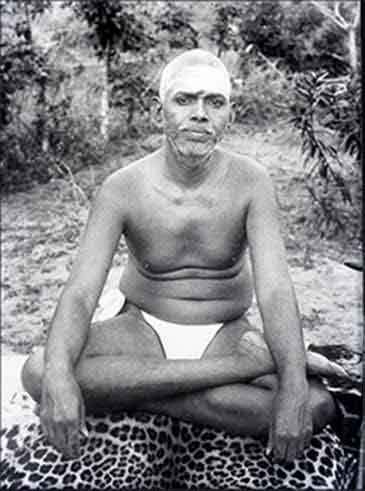 Ramana Maharshi taught the meditation practice of self-enquiry
Ramana Maharshi taught the meditation practice of self-enquiryFew seekers are able to align with the deeper reality without
doing anything. They need some kind of spiritual practice in order to escape
the confines of the ego-controlled mind. For these seekers, Ramana Maharshi
taught self-enquiry.
The ego is sustained by thoughts. And all thoughts originate
from the assumption that there is an “I” that experiences something. For
instance: “I am walking,” “I see a tree outside my window,” or “I live in this
house.” The “I” is the subject that always focuses on some object.
Self-enquiry is centered on the question “Who am I?” The
answer is not meant to be conceptual. Rather, the question is intended to move
your attention onto the source of the “I,” which can be felt within as your
inner awareness. Ask the question, “Who am I?” and allow the answer to appear
as a feeling deep within you. By remaining focused on this inner feeling, the
thoughts of “I” experiencing something gradually disappear. Then you can align
with the formless unity.
You can practice self-enquiry throughout the day. When a
thought arises in your mind, you might ask the question, “From whom does this
thought arise?” The answer would be, “From me.” Then ask, “Who am I?” And your
attention will be drawn away from thought and onto the feeling of “I” within.
After learning how to intuitively feel your inner awareness,
you don’t need to start with the question “Who am I?” Instead, simply focus on
the feeling of “I” within, which will gradually still your mind and enable you
to come into alignment. When the ego reasserts itself and you become lost in
thought, just return your attention to the feeling of “I.”
Self-enquiry is different from practices that
focus on some object as a way of stilling the mind. Instead, you hold your
attention on the subject, the “I” that perceives. Ramana Maharshi viewed
self-enquiry as superior to other practices, such as meditation or repeating a
mantra. They keep the “I” active and eventually lead a person to the same place
as self-enquiry, which he viewed as a more direct path.
In the beginning stages of self-enquiry, it can be challenging
to feel your inner sense of “I.” As with all practices, the grace of an
enlightened teacher will help you. Immerse yourself in the teachings of Ramana Maharshi,
and you will discover your inner awareness.
Then hold your attention on the “I” at every opportunity.
Your past conditioning will dissolve. And eventually the “I” will disappear into
the formless.
Surrender
Surrender is the practice of offering up all that you are
and all that you experience to the divine. It is one of the most effective means
of dissolving the illusion of separateness.
Surrender is part of the bhakti spiritual path, which also
includes devotion and love. Through devotion, you constantly turn your
attention to the divine, either in its formless state or in the form of a saint.
Through love, you open your heart to God. People of all different religions are
bhakti yogis.
To cross the vast gulf between separateness and unity, a person
must let go of everything. Nothing can be held back for the ego to cling to and
claim for its own. Identify the aspects of yourself that you are hoping to
preserve through the spiritual journey, and allow them to be burned away by the
divine light.
Complete surrender eventually brings liberation and an end
to the false self, which can be frightening. Each of us has identified with the
false self for countless lifetimes. We are subconsciously convinced that its
death will bring an end to our existence. The fear is so intense that surrender
usually happens in increments, as our past conditioning gradually dissolves.
When you reach an advanced stage of the path, there is a
growing longing to merge with the divine. You recognize that the end of the
false self enables you to be who you truly are.
God will wait patiently until you decide to surrender everything.
And once you do, you can be free.
Prayer
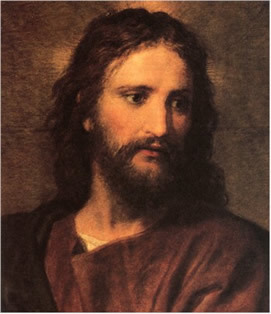 The world savior Jesus Christ
The world savior Jesus ChristThrough prayer you attract grace into your life. Some
people pray directly to the divine, although many find it easier to pray to an
enlightened master who is associated with their religion. For instance, a Christian
may pray to Jesus, Mother Mary, or one of the Christian saints.
Your prayers to an enlightened master are most effective
when you have created a strong internal connection with them. However, many
people don’t put forth the effort to form such a connection. They only pray
when they need help or want something.
Prayer is not always answered in the way that you want. An
unpleasant situation in your life is usually the result of karma created in the
past. The karma may have ripened to the point that the situation cannot be avoided.
Grace can then enable you to deal with it in the best possible way.
Sometimes prayers go unanswered for your own benefit. What you
initially view as a bad thing may, in the long term, lead to a positive
outcome. For instance, a temporary setback enables something greater to
manifest in your personal life, or it weakens the ego and turns your attention
to the divine.
Take advantage of God’s mercy and love. Pray for happiness and to be relieved of personal difficulties. Most important, pray that you will be guided on the path and quickly attain liberation.
Aligning with Daily Energetic Shifts
There is a rhythm to nature. During certain times
of the day, the infinite is easier to access using any spiritual practice.
Between midnight and sunrise, the stillness of
nature comes to the forefront, which draws your life force inward. Many seekers
prefer to meditate in the early morning when their energetic system is in
balance and the mind is less active.
In the hour before and after sunset, the formless reveals
itself. Take advantage of the opportunity and align with it.
Visiting Holy Places
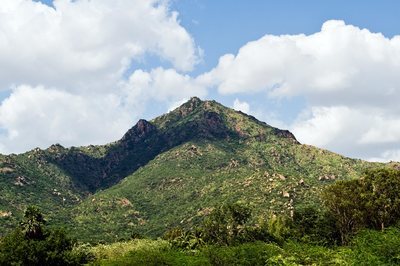 Arunachala mountain in Tiruvannamalai, India is a manifestation of Shiva, the universal consciousness
Arunachala mountain in Tiruvannamalai, India is a manifestation of Shiva, the universal consciousnessA holy place is a location on Earth that is saturated with
the light of Source. The energy of the place vibrates at the highest, subtlest
levels. While there, you can more easily access the higher planes of reality.
Some places have been considered holy for millennia, as if
they were part of the design of creation. For instance, Arunachala Mountain in
Tiruvannamalai, India, is considered to be a manifestation of Shiva.
Other locations have become holy through the grace of an
enlightened master. For instance, the awakened presence of Paramahansa Yogananda
can still be felt at his former residence in Encinitas, California. And at
Meher Baba’s burial site in Meherabad, India, you are immersed in his grace and
love.
Selfless Service
Selfless service is the spiritual practice of helping
people. As an expression of love, you think of others ahead of your own needs
and wants.
Helping people is spiritually beneficial when you are able
to remain detached from the consequences of your good deeds. You serve others
without any desire to be recognized as a “good” person. Ideally, you don’t even
identify yourself as the doer of good deeds. As long as you perceive a difference
between yourself and those who are being helped, you are still identifying with
the ego. Focus on what is shared between you and others, the infinite awareness
that exists within all things.
This article is excerpted from the book Into the Formless by Brian D. Stephens.
The post Spiritual Practices List appeared first on The Spiritual Journey.
November 11, 2019
Muruganar Quotes
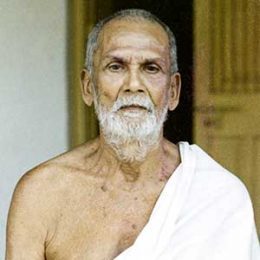 Muruganar was a prolific poet and writer who attained liberation through the grace of Ramana Maharshi.
Muruganar was a prolific poet and writer who attained liberation through the grace of Ramana Maharshi.
Muruganar spent years in Sr Ramana Ashram listening to Ramana answer questions from devotees. He summarized many of the answers into four line verses which were then edited by Ramana Maharshi.
Some of Muruganar’s writings have been published in two books: Guru Vachaka Kovai and Padamalai. Below are some of the passages from those books.
Guru Vachaka Kovai by Muruganar
“To the ignorant, who believe it to be real and revel in it, the world that appears before them is God’s creation, but to the steadfast jnanis, who have known the bondage-free Self by direct experience, it is merely a deluding and binding concept that is wholly mental.”
– Muruganar, Guru Vachaka Kovai, verse 21
“Do not be confounded by this worthless samsara that appears as a dream in the deluding [sleep of] ignorance. In a mind that has an intense desire for reality — consciousness, the supreme — it is impossible for the binding mental delusion that arises in the dense darkness of ignorance to remain.”
– Muruganar, Guru Vachaka Kovai, verse 27
“The worldly life is a dreamlike appearance, sapless and deluding, that functions through the mixture of the pairs of opposites such as desire and aversion. It appears as if real only as long as one is under the spell of the maya-sleep. It will end up being totally false when one truly wakes up into the maya-free Self.”
– Muruganar, Guru Vachaka Kovai, verse 41
“The world that veils the Self through names and forms, and appears to be real, is only a dream-like appearance. If, instead, that very same world gets veiled by the Self and appears as consciousness alone, then, as the Self, it too is real.”
– Muruganar, Guru Vachaka Kovai, verse 47
“All the differences that, crowding together, accumulate to form the world are in truth only the sport of grace, the power of the one consciousness. Therefore, jnani whose sole focus is the knowledge of the radiant reality will never perceive the world of many differences except as a mere appearance.”
– Muruganar, Guru Vachaka Kovai, verse 58
“Those who have known the truth as it really is will not declare this world, which is forever undergoing destruction by the wheel of time, to be real. Only the plenitude that shins uninterruptedly at all times and in all places, transcending time and space, is the nature of reality.”
– Muruganar, Guru Vachaka Kovai, verse 65
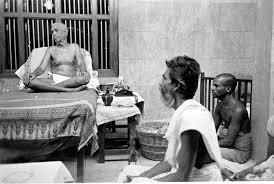 Muruganar in the Sri Ramana Ashram with Ramana Maharshi
Muruganar in the Sri Ramana Ashram with Ramana Maharshi “Reach the Heart by clearly knowing your true nature and abide there permanently as that unattached Supreme Self, without slipping from the state of knowledge. Then, act according to the human role you have assumed, outwardly behaving as if, like all others in the world, you are experiencing joy and misery.”
– Muruganar, Guru Vachaka Kovai, verse 81
“The Self abides motionless because of its all-pervasive fullness. Because the apparent connection between the Self and the mind-limitation seems to exist on account of ignorance — which is the jiva-perspective, the reflected consciousness that rises as ‘I’ — the Self too appears to have experienced movement through the motion of the mind. But the movement of samsara that comprises birth and death, bondage and liberation, and so on, is only for the jiva and never for the Self, the transcendental reality.”
– Muruganar, Guru Vachaka Kovai, verse 94
“The world does not exist without the body; the body never at any time exists without the mind; the mind does not exist at all apart from consciousness; and consciousness too does not exist apart from being.”
— Muruganar, “Guru Vachaka Kovai” verse 99
“The deeper intention of the scriptures in describing the sequence of creation in different ways is not to proclaim the correct theory of creation but to promote enquiry into the Supreme Reality that is the primal source of creation. This is the real puport behind the sastras [scriptures] that describe the details of creation.”
– Muruganar, Guru Vachaka Kovai, verse 102
“Since, through the enquiry ‘Who am I?’, the ego is destroyed in those who have known and reached the Heart that is the source of the rising ego, the dualistic pairs of opposing thoughts that exist depending on the ego, which together comprise the notion of bondage, are also totally destroyed. [Within such people] the darkness of ignorance that was the basis of the ego is also annihilated and they become the swarupa, the Supreme Self, the Heart that is eternally free of defilement. As the have attained the surging of the true and supreme bliss within themselves, at that very moment they are freed from the sorrow of birth.”
– Muruganar, Guru Vachaka Kovai, verse 260
“This is the definitive advice for those who desire to gain redemption: like the tortoise that retracts its five [limbs], restrain and withdraw the five senses, turn your mind towards the Self, and remain absorbed in it. This alone is happiness.”
– Muruganar, Guru Vachaka Kovai, verse 291
“Resolving that the world of names and forms, an imaginary concept, is only a dream in which not even one of the many things perceived exists apart from the perceiver, meditate on the blissful reality, the form of consciousness, without pursuing the world.”
– Muruganar, “Guru Vachaka Kovai” verse 293
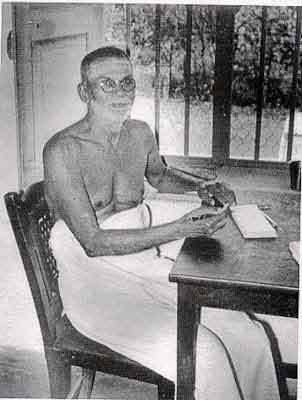 Murganar wrote exclusively about Ramana Maharshi
Murganar wrote exclusively about Ramana Maharshi“Like the one string that runs without a break through the many beads in a rosary, God runs through and sustains every religion. He is the light that shines in all the innumerable jivas, as them, and not different from them.”
– Muruganar, “Guru Vachaka Kovai” verse 339
“Just as the single element, fire, is seen as many flames by virtue of the numerous earthenware lamps, similarly, the one Self is seen as multiple beings by virtue of the many apparently existing limitations [upadhis].”
— Muruganar, Guru Vachaka Kovai, verse 340
“Various religions that enable [the attainment of jnana] have come into existence to suit the various levels of mental maturity. The wisest course, therefore, is to have a harmonious outlook towards these religions, which deserve to be practiced.”
– Muruganar, Guru Vachaka Kovai, verse 342
“In those who abide in the Heart that exists as the form of grace, the mind, whose nature is darkness, will completely die. In their vision, which has attained the splendor of the direct experience that overflows, assuming the form of reality, everywhere and everything is saturated with bliss.”
– Muruganar, Guru Vachaka Kovai, verse 346
“Having become free from concepts, which are afflicting thoughts, and with the ‘I am the body’ idea completely extinguished, one ends up as the mere eye of grace, the non-dual expanse of consciousness. This is the supremely fulfilling vision of God.”
– Muruganar, Guru Vachaka Kovai, verse 348
“Having restrained the deceitful senses, and having abandoned mental concepts, you should stand aloof in your real nature. In that state of Self-abidance in which you remain firmly established in the consciousness of the Heart, Sivam will reveal itself.”
– Muruganar, Guru Vachaka Kovai, verse 349
“O foolish mind, you who have wallowed in suffering by desiring the trivial pleasures of this world and the next [heaven]! If you remain still without thoughts, you will certainly attain the supreme bliss of liberation that transcends both of these.”
– Muruganar, Guru Vachaka Kovai, verse 379
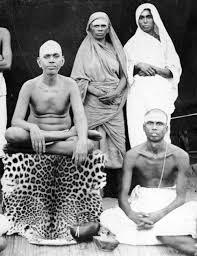 Ramana Maharshi and Muruganar seated in front
Ramana Maharshi and Muruganar seated in front“The spurious jiva that seeks its real nature by the enquiry ‘Who am I?’ will become in the end the real Self, free of the ‘I’.”
– Muruganar, Guru Vachaka Kovai, verse 388
“The consciousness that ignores the Self, whose nature is pure consciousness, and which regards perceived objects as real, is false. It is ignorance brought about by maya. Though one may learn all that one desires, true knowledge is only the complete elimination of all such conceptual and differentiated objective knowledge and its total transformation into Self alone in the direct experience of one’s real nature, the non-dual pure consciousness.”
– Muruganar, Guru Vachaka Kovai, verse 420
“Except for the swarupa that exists as the non-dual being-consciousness, and which is never subject to delusion, everything else, which is a dualistic appearance, is wholly made up of maya, the master of daring pretense. Therefore, those who do not clearly know by careful investigation the natural truth of swarupa will suffer through the delusion that the world and God are different from them.”
– Muruganar, Guru Vachaka Kovai, verse 430
“All things are actually consciousness. When they are known as consciousness only and become completely subsumed in one’s Self, which is consciousness, differences are completely annihilated, and your real nature shines. You should know that this is the incomparable liberation.”
– Muruganar, Guru Vachaka Kovai, verse 436
“Reality is only the supremely blissful consciousness that shines without any kind of difference in the focused state of a mind that has become mature by virtue of living entirely free of desires.”
– Muruganar, Guru Vachaka Kovai, verse 464
“The worldly life is a dreamlike appearance, sapless and deluding, that functions through the mixture of the pairs of opposites such as desire and aversion. It appears as if real only as long as one is under the spell of the maya-sleep. It will end up being totally false when one truly wakes up into the maya-free Self.”
– Muruganar, Guru Vachaka Kovai, verse 41
Padamalai by Muruganar
“Know the pure state, your own real nature, by keenly observing the interval between two thoughts.”
– Muruganar, Padamalai, verse 13
The post Muruganar Quotes appeared first on The Spiritual Journey.
November 9, 2019
Mother Meera Quotes
This page includes some of my favorite quotes by Mother Meera. They are organized by the book in which they are found.
Answers by Mother Meera
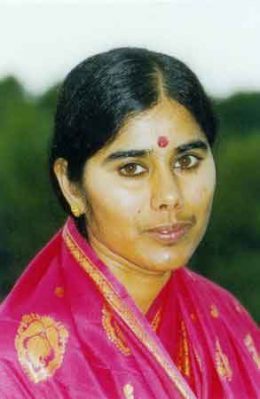 Mother Meera is an incarnation of the divine mother
Mother Meera is an incarnation of the divine mother“Each person has his or her own path. Choose the one that is easy, convenient, and that comes spontaneously. The choice is influenced by one’s past and by familiar practices.”
– Mother Meera, Answers, p50
“The soul acts as a protector during our lives, and is always with us. It has no wishes of its own. It is not only a witness or a guide but also helps our development. Free from the influence of our actions, it remains permanently with us through our lives until we unite with the Divine.”
– Mother Meera, Answers, p89
“When you get to the top of the mountain, then you must go down again and help others up, according to their capacities and strength. There is no rest in this work; the highest serves most lovingly; the wisest listens best; the one who has seen gives his whole life to help others to see. This is the divine way.”
– Mother Meera, Answers, p119
“Offering everything, pure and impure, is the best and quickest way to develop spiritually. If your offer everything to the Divine, the Divine will accept and change it, even the worst things. It is not what you offer but that you offer which is important. Offer everything and you will acquire the habit of thinking always about God. That will change you.”
– Mother Meera, Answers, p78-79
“If we only accept our karma and act according to that, there will be no end to it – our karma will continue for many, many lives. However, if we pray and offer the fruits of our actions to the Divine, then our karma can be stopped, lessened, or transformed.”
– Mother Meera, Answers, p71
“Evil is real, but not the final reality. The final reality is the Light and love of God. Root yourself in that final reality always and at every moment, and evil will crumble around you.”
– Mother Meera, Answers, p112
“She gives help for physical, mental, vital and spiritual well-being, gives peace, and helps people to obtain their needs. When humans on Earth are afflicted with difficulties, it is the Divine Mother who relieves suffering and lifts them up.”
– Mother Meera, Answers, p17
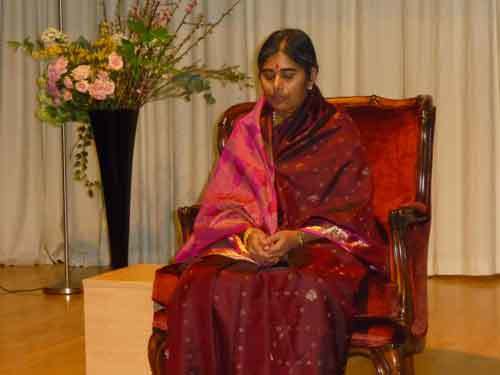 Mother Meera travels the world giving silent darshan
Mother Meera travels the world giving silent darshan“Suffering is one way, but it is not the main way. It comes by itself; you don’t have to ask for it. If you are suffering naturally you will ask for happiness. But the Divine never says that suffering is necessary – this idea is created by human beings. The Divine asks us to be happy, harmonious and peaceful.”
– Mother Meera, Answers, p84-85
“Paramatman is infinite light and is the Source of all, of being, knowledge, bliss, of peace, of each atman, each soul.”
– Mother Meera, Answers, p13
“I cannot say at what level you will be when you see it. It depends on your strong aspiration to see it and also on the maturity of your practice. It is the aim of human beings to see the Paramatman Light, first to see it and then to merge with it.”
– Mother Meera, Answers, p38
“Happiness and spiritual growth are connected. Being peaceful and being happy form the most important foundation of spiritual practice. Then the practice goes by itself.”
– Mother Meera, Answers, p10
“We have to try to reveal that Light which is hidden in us as a bud. It must blossom like a flower. In all things everywhere, in all beings, the Light is hidden, and it must be revealed. If we try with all our hearts we will be successful. I want the Paramatman Light to blossom everywhere.”
– Mother Meera, Answers, p13
“Sadhana can be done with family life. People should stay where they are and turn all their attention to the Divine and open to the Light.”
– Mother Meera, Answers, p93
“Close your eyes and sit in silence and do japa on any divine name. … Yes, whatever appeals at the moment is all right. One doesn’t have to have a fixed mantra.”
– Mother Meera, Answers, p63-64
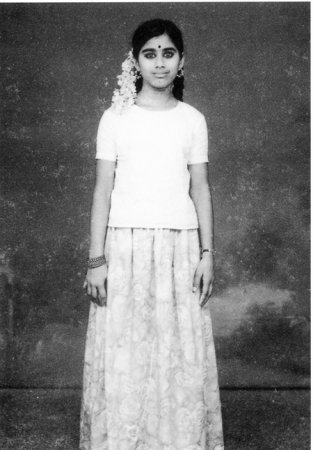 Mother Meera was born enlightened
Mother Meera was born enlightened“Studying different paths is useful because it gives a knowledge of the path I general as well as a respect for other traditions. If we know only a few paths we may hold a limited, rigid view. A broad background is better – it helps us when we have experiences by giving us clarification and confidence that we are going in the right direction.”
– Mother Meera, Answers, p87
“If there is pride or vanity, then you are not awake. The really great saints and yogis are always the most humble. Humility is love; humility is what the heart knows. True joy is humble, because is pure and given. A humble man is always quick to see his mistakes. Unless you are humble, the Divine will not use you. My power will only pass through you when you are clear – otherwise it would be dangerous for you. You must keep yourself clear at all times. The ego will keep on trying to seize for itself what the soul is learning.”
– Mother Meera, Answers, p68
Answers II by Mother Meera
“An Avatar is born with wisdom and a jnani achieves wisdom through sadhana.”
– Mother Meera, Answers II, p18
“An Avatar is a divine incarnation and comes for the uplifting of the whole human race, for divine purpose.”
– Mother Meera, Answers II, p15
“Avatars come from Paramatman. To come to earth, thy do not need to have previous incarnations as human beings. They are always Avatars. Whenever Paramatman asks them to go to earth, they are born on earth. Avatars have no good or bad karma. There is no karma for them. They are above karma. Karma is only for human beings.”
– Mother Meera, Answers II, p17
“The light is continuously coming down. Some see it already at darshan. Some see it outside darshan. Eventually everyone will see it and be transformed.”
– Mother Meera, Answers II
“It is better to be content with what God has given you. Happiness does not depend on the money or outside circumstances but on the peace within you.”
– Mother Meera, Answers II, p77
The post Mother Meera Quotes appeared first on The Spiritual Journey.
November 8, 2019
Dalai Lama Quotes
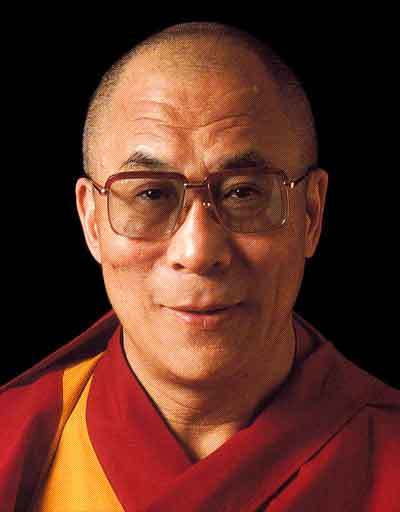
“After attaining enlightenment he [the Buddha] turned the Wheel of Dharma for beings of good fortune, revealing what must be overcome and what must be accomplished in order to transcend the stages and levels leading to higher rebirth, liberation and omniscient perfection.”
– The Dalai Lama, The Path to Enlightenment, p25
“Although all humans are equal, each of us has our individual background our unique way of seeing and appreciating things, our own spiritual and philosophical tastes.”
– The Dalai Lama, The Path to Enlightenment, p26
“The deepest impulse of all sentient beings is to experience happiness and to avoid suffering.”
– The Dalai Lama, The Path to Enlightenment, p30
“The difficulty with a purely materialistic interpretation of life is that, in addition to ignoring an entire dimension of the mind, it does not deal effectively with the problems of this life.”
– The Dalai Lama, The Path to Enlightenment, p31
“A materialistic mind is an unstable mind, for its happiness is built on transient, physical circumstances.”
– The Dalia Lama, The Path to Enlightenment, p31
“To ignore death and its implications will not prevent us from dying nor will it help us to enter the after-death state with any degree of spiritual maturity.”
– The Dalai Lama, The Path to Enlightenment, p31
“Although it is essential to maintain a reasonable material basis on which to live, the emphasis in one’s life should be on cultivating the mental and spiritual causes of happiness.”
– The Dalai Lama, The Path to Enlightenment, p31
“If one cultivates spiritual qualities such as mental harmony, humility, non-attachment, patience, love, compassion, wisdom and intelligence able to deal effectively with the problems of this life; and because the wealth that one is amassing is mental rather than material, it will not have to be left behind at death. There is no need to enter the after-death state empty-handed.”
– The Dalai Lama, The Path to Enlightenment, p31
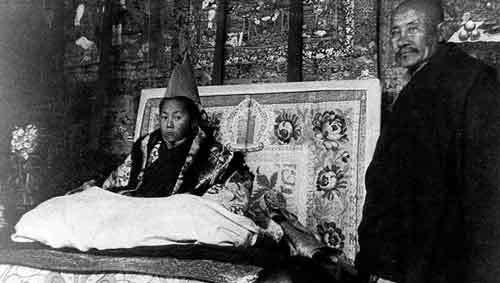 The Dalai Lama was officially recognized at the age of four
The Dalai Lama was officially recognized at the age of four“They who possess spiritual understanding can control their destiny at the time of death, but for ordinary beings the process is very much an automatic chain reaction of karmic seeds and habitual psychic response patterns.”
– The Dalai Lama, The Path to Enlightenment, p32
“Death holds very little hope for ordinary worldly person with no spiritual experience. Having passed their entire lives ignoring death and sheltering themselves from thoughts of it, when it strikes they become utterly shocked and lose all courage and confidence. Everything that confronts them is unknown, for they never took the time to apply the methods that reveal the nature of mind, birth, life and death. Control over one’s future evolution is to be won during one’s life, not at the time of death.”
– The Dalai Lama, The Path to Enlightenment, p32-33
“We wish to avoid suffering, but because our minds are not cultivated in wisdom we run directly towards suffering like a moth caught in the light of a flame.”
– The Dalai Lama, The Path to Enlightenment, p33
“Our repeated experience of frustration, dissatisfaction and misery does not have external conditions as its root cause. The problem is mainly our lack of spiritual development. As a result of this handicap, the mind is controlled principally by afflicted emotions and illusions. Attachment, aversion, and ignorance rather than a free spirit, love and wisdom are the guiding influences. Recognizing this simple truth is the beginning of the spiritual path.”
– The Dalai Lama, The Path to Enlightenment, p33
“A sage with a mind of wisdom, compassion and power dwells in joy and creates only causes of joy. Conversely, the more deluded one is, the more miserable is one’s present condition and the fewer are the causes of joy created by one’s activities throughout life.”
– The Dalai Lama, The Path to Enlightenment, p33-34
“Our present condition is not something causeless nor is it something caused by chance. It is something we ourselves have steadily constructed through our series of past decisions and the actions of body, speech and mind that arose from them. To place the blame upon an external person or things is just a source of further confusion and negativity, increasing rather than solving the difficulty.”
– The Dalai Lama, The Path to Enlightenment, p33
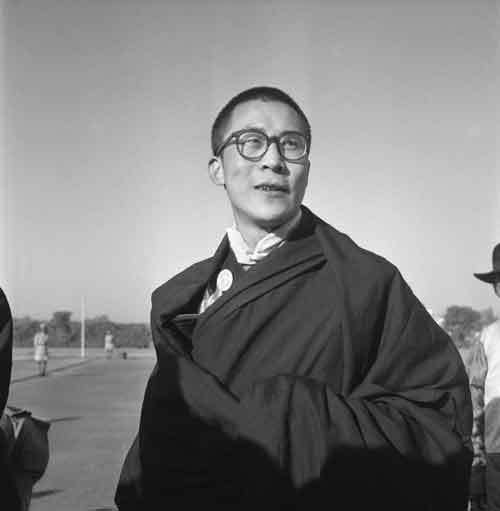 Dalal Lama led the Tibetan government until 2011
Dalal Lama led the Tibetan government until 2011As aspect of death that most terrifies many beings is that suddenly one is totally alone and unsupported by anything but one’s spiritual knowledge. When this is strong one is able to deal effectively with every circumstance that death brings; but when it is weak, one must enter the dangerous path of the bardo empty-handed. Then one’s heart will fill with regret and one will realize the error of not having pursued deeper goals.”
– The Dalai Lama, The Path to Enlightenment, p36-37
“Instead of meaningless literature we should try to read from the biographies and writings of past masters.”
– The Dalai Lama, The Path to Enlightenment, p38
“Human beings can fall into the most profound spiritual darkness or attain to the exalted state of perfect illumination. What happens to us lies in our own hands. If we cultivate our minds with spiritual methods and generate positive, creative lifestyles and directions, no doubt we will be benefited. Alternatively, if we merely chase superficial goals and pay no attention to the deeper needs of the minds, we are bound to fall into frustration and confusion.”
– The Dalai Lama, The Path to Enlightenment, p38
When we look for the sources of all the problems that confront human life we usually blame everything but the root cause: our lack of spiritual discipline and realization.”
– The Dalai Lama, The Path to Enlightenment, p38
“To attain liberation from samsara one must perfect the three higher trainings of self-discipline, meditative concentration, and the wisdom of emptiness.”
– The Dalai Lama, The Path to Enlightenment, p40
“When we understand the empty, non-inherent nature of the self and phenomena, the endless forms of delusion that arise from grasping at true existence are directly eliminated.”
– The Dalai Lama, The Path to Enlightenment, p40
“In order for the training in wisdom to mature and become strong, one must first develop meditative concentration; and in order to develop and support concentration one should cultivate the training in self-discipline, which calms the mind and provides an atmosphere conducive to meditation.”
– The Dalai Lama, The Path to Enlightenment, p40
 Dalai Lama at a public teaching on Buddhism
Dalai Lama at a public teaching on Buddhism“Meditation upon impermanence and death is very useful for it cuts off attraction toward transient and meaningless activities and causes the mind to turn towards Dharma.”
– The Dalai Lama, The Path to Enlightenment, p87
“We should be mindful of death and should engage in the practices that generate spiritual qualities, qualities that will not only benefit us in this lifetime but will provide us with the ability to face death and the bardo competently.”
– The Dalai Lama, The Path to Enlightenment, p90
“Positive ways have positive effects on the mind in this life and lay the foundations for happiness after death.”
– The Dalai Lama, The Path to Enlightenment, p94
“Dharma, or the teachings is not a series of instructions to be believed and followed out of blind faith. The practice of Dharma should be carried out on the basis of reason and contemplation.”
– The Dalai Lama, The Path to Enlightenment, p99
“All beings suffer in the same way as we do, and some are even more deeply immersed in sorrow. Yet all of these beings wish to experience only happiness and to avoid all suffering, frustration, and pain. They wish lasting happiness but do not know how to cultivate its causes, and they wish to avoid misery but automatically collect only causes of further misery.”
– The Dalai Lama, The Path to Enlightenment, p136
“Over the billions of lifetimes that we have experienced since beginningless time, we have known all the living beings again and again. Sometimes they have been parents to us, sometimes friends or mates, sometimes enemies.”
– The Dalai Lama, The Path to Enlightenment, p137
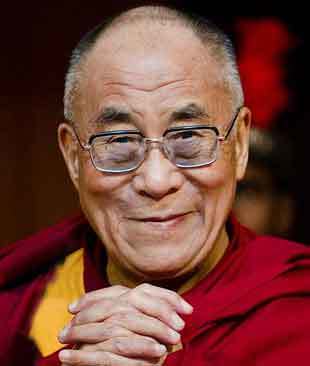 Dalai Lama still teaches from his residence in Dharmasala, India
Dalai Lama still teaches from his residence in Dharmasala, India“What is [spiritual] progress? How do we recognize it? The teachings are like a mirror before which we should hold our activities of body, speed, and mind. Think back to a year ago and compare the stream of activities of your body, speed, and mind at that time with their present condition.”
– The Dalai Lama, The Path to Enlightenment, p176
“As Buddha himself advised, ‘Work out your own salvation.’ We must practice with clarity, humility, and a sense of personal responsibility for our own progress. Then the path to enlightenment is something that we hold in the palms of our own hands.”
– The Dalai Lama, The Path to Enlightenment, p184
How to See Yourself As You Really Are by The Dalai Lama
“True love and compassion rise on the basis of respecting others. This feeling of empathy is achieved by recognizing that you and all others—whether friends, enemies, or neutral parties—share a central aspiration by wanting happiness and not wanting suffering.”
– The Dalai Lama, How to See Yourself As You Really Are, p206
“We are unnecessarily drawn into suffering by assenting to false appearances, thereby falling prey to lust and hatred and all the actions that stem from them, accumulating karma, and being born over and over again in a cycle of pain.”
– The Dalai Lama, How to See Yourself As You Really Are, p224
The Tibetan Book of the Dead translated by Gyurme Dorje
“Our fundamental ignorance is the root of conditioned existence and karmic energy is its activating force. It’s the nature of our habitual tendencies that generates our future existence, driven by natural law of cause and effect.”
– The Dalai Lama, The Tibetan Book of the Dead, Introduction
Teaching New York May 1998 by The Dalai Lama
“Bodhicitta, which literally means generating the mind for enlightenment, carries the sense that we are generating within ourselves a genuine aspiration to attain enlightenment not just for the sake of ourselves but rather for being of benefit to all sentient beings.”
– The Dalai Lama, Teaching New York May 1998
“The key to the attainment of bodhicitta, the mind of enlightenment, is the cultivation of great compassion. Great compassion is a state of mind that focuses on the suffering of sentient beings and cultivates the strong wish to see these sentient beings free from not only the manifest suffering but also from the causes and conditions that lead to suffering.”
– The Dalai Lama, Teaching New York May 1998
The post Dalai Lama Quotes appeared first on The Spiritual Journey.
November 7, 2019
Meher Baba Quotes
This page includes some of my favorite quotes by Meher Baba. They are organized by the book in which they are found.
Discourses by Meher Baba
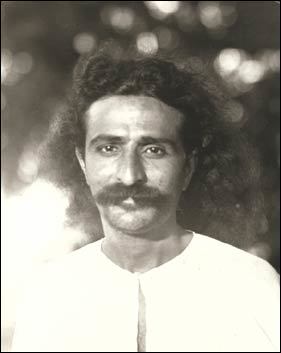 Meher Baba an incarnation of the world savior
Meher Baba an incarnation of the world savior“There is no sadhana greater than love, there is no law higher than love, and there is no goal that is beyond love – for love in its divine state becomes infinite. God and love are identical, and one who has divine love already has God.”
– Meher Baba, Discourses, p264
“When one’s experience of this world is sufficiently mature, however,
the repeated disillusionments in life set one on the right track to
discover what is missing. From that moment the individual seeks a
reality that is deeper than changing forms.”
– Discourses, by Meher Baba, p129
“One of the paradoxes connected with spiritual sadhana is that all effort of the aspirant is intended for arriving at a state of effortlessness.”
– Meher Baba, Discourses, p264
“There is no gift greater than the gift of spiritual freedom, and there is no task more important than the task of helping others to achieve spiritual freedom. Those who have understood the supreme importance of spiritual freedom have not only to strive for it for themselves but also to share the God-given duty of helping others win it.”
– Meher Baba, Discourses, p342
“Spiritual freedom has to be won by oneself for oneself through watchful and unfailing war against the lower self and the lower desires.”
– Meher Baba, Discourses, p342
“It is your right to be happy and yet you create your own unhappiness by wanting things. Wanting is the source of perpetual restlessness. If you do not get the thing you wanted, you are disappointed. And if you get it, you want more and more of it and become unhappy. ”
– Meher Baba, Discourses, p10-12
“The world is caught up in Maya and is addicted to false values. Therefore the ways of the world run counter to the standards the aspirant has set for himself.”
– Meher Baba, Discourses, p356
“Just as a person may seek to hold on to his separative existence through escape or identification with external forms, he may seek to hold on to it through identification with some narrow class, creed, sect, or religion, or with the divisions based upon sex. Here the individual may seem to have lost his separative existence through identification with a larger whole. But, in fact, he is often expressing his separative existence through such an identification, which enables him to delight in his feeling of being separate from others who belong to another class, nationality, creed, sect, religion, or sex.”
– Meher Baba, Discourses, p7
 Meher Baba learned he was the Avatar at the age of nineteen through the perfect master Hazrat Babajan
Meher Baba learned he was the Avatar at the age of nineteen through the perfect master Hazrat Babajan“All the different types of freedom that fasten upon some external conditions must, in their very nature, exist within certain limits … Only spiritual freedom is absolute and unlimited.”
– Meher Baba, Discourses, p341
“If the worldly-minded turn to God at all, it is mostly for their own selfish and mundane purposes. They seek the gratification of their own desires, hopes, and even revenges through the intervention of the God of their imagination. They do not seek God as Truth. They long for all things except the only Truth, which they regard as unimportant.”
– Meher Baba, Discourses, p373
“Human consciousness is clouded by the accumulation of various types of impressions deposited by the long course of the evolution of consciousness. These impressions express themselves as desires, and the range of the operation of consciousness is strictly limited by these desires. The sanskaras, or impressions, form an enclosure around the possible field of consciousness. The circle of sanskaras constitutes that limited area in which alone the individual consciousness can be focused.”
– Meher Baba, Discourses, p10
“Owing to the hindrance of multifarious desires, it becomes impossible for the soul to find free and full expression of its true being, and life becomes self-centered and narrow. The entire life of the personal ego is continually in the grip of wanting, that is, an attempt to seek fulfillment of desires through things that change and vanish. But there can be no real fulfillment through the transient things. The satisfaction derived from the fleeting things of life is not lasting and the wants of man remain unfulfilled. There is thus a general sense of dissatisfaction accompanied by all kinds of worries.”
– Meher Baba, Discourses, p10-11
“All over the world the spirit of man is crying out for freedom. … And any lesser type of freedom is comparable to a house built on sand, and any lesser type of attainment is fraught with the fear of decay.
– Meher Baba, Discourses, p340-341
“The ego wants to feel separate and unique, and it seeks self expression either in the role of someone who is decidedly better than others or in the role of someone who is decidedly inferior. … The superiority complex is stirred when a person meets someone who is in some way remarkably inferior in mundane possessions. … The inferiority complex is stirred when a person meets someone who is in some way remarkably superior in respect to mundane possessions.”
– Meher Baba, Discourses, p172-174
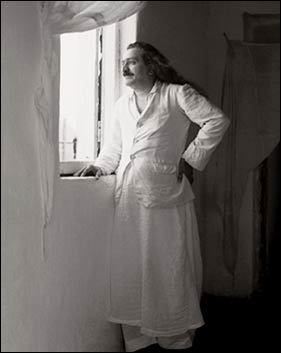 Meher Baba often went into seclusion for his spiritual work
Meher Baba often went into seclusion for his spiritual work“Perfection consists in remaining free from the entanglements of duality. Such freedom from entanglements is the most essential requirement of unhindered creativity. But this freedom cannot be attained by running away from life for fear of entanglement. This would mean denial of life. Perfection does not consist in shrinking from the dual expressions of nature. The attempt to escape from entanglement implies fear of life. Spirituality consists in meeting life adequately and fully without being overpowered by the opposites. It must assert its dominion over all illusions-however attractive or powerful. Without avoiding contact with the different forms of life, a Perfect One functions with complete detachment in the midst of intense activity.”
– Meher Baba, Discourses, p. 15.
“Divine love is qualitatively different from human love. Human love is for the many in the One, and divine love is for the One in the many. Human love leads to innumerable complications and tangles, but divine love leads to integration and freedom.”
– Meher Baba, Discourses, p115
“Love is the reflection of God’s unity in the world of duality.”
– Meher Baba, Discourses, p116
“When love is deep and intense, it is called bhakti, or devotion. … The purity, sweetness, and efficacy of the love that the lover receives from the Master contributes to the insuperable spiritual value of this highest phase of love.”
– Meher Baba, “Discourses”, p55-56
“The ego is activated by the principle of self-perpetuation and has a tendency to live and grow by any and all means not closed to it. If the ego faces curtailment in one direction, it seeks compensating expansion in another. If it is overpowered by a flood of spiritual notions and actions, it even tends to fasten upon this very force, which was originally brought into play for the ousting of the ego. If a person attempts to cultivate humility in order to relieve himself of the monstrous weight of the ego and succeeds in doing so, the ego can, with surprising alacrity, transfer itself to this attribute of humility. It feeds itself through repeated assertions like “I am spiritual,” just as in the primary stages it achieved the same task by assertions like “I am not interested in spirituality.” Thus arises what might be called a spiritual ego, or an ego that feels its separateness through the attainment of things considered to be good and highly spiritual. From the truly spiritual point of view, this type of ego is as binding as the primary and crude ego, which makes no such pretensions.”
– Meher Baba, Discourses, p170-171
“The ego thus marks and fulfills a certain necessity in the further progress of consciousness. However, since the ego takes shelter in the false idea of being the body, it is a source of much illusion, which vitiates experience. It is of the essence of the ego that it should feel separate from the rest of life by contrasting itself with other forms of life. Thus, though inwardly trying to complete and integrate individual experience, the ego also creates an artificial division between external and internal life in the very attempt to feel and secure its own existence. This division in the totality of life cannot but have its reverberations in the inner individual life over which the ego presides as a guiding genius.”
– Meher Baba, Discourses, p161-162
“Every thought, feeling, or action that springs from the idea of exclusive or separate existence binds.”
– Meher Baba, Discourses, p167
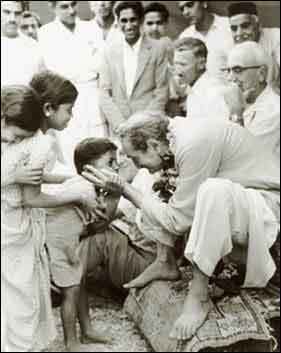 Meher Baba gave darshan to thousands of people at a time
Meher Baba gave darshan to thousands of people at a time“Human actions are based upon the operation of the impressions stored in the mind through previous experiences. Every thought, emotion, and act is grounded in groups of impressions that, when considered objectively, are seen to be modifications of the mind. These impressions are deposits of previous experiences and become the most important factors in determining the course of present and future experience. The mind is constantly creating and gathering such impressions in the course of its experience.”
– Meher Baba, Discourses, p32
“All these methods of negating the positive sanskaras are ultimately based upon the control of the body and mind. … When this energy locked up in the sanskaras is thus diverted, they get dispersed and exhausted.”
– Meher Baba, Discourses, p49-51.
“The descent of the grace of the Master is conditioned, however, by the preliminary spiritual preparation of the aspirant. This preliminary preparation for grace is never complete until the aspirant has built into his spiritual makeup some divine attributes. For example, when a person avoids backbiting and thinks more of the good points in others than of their bad points, and when he can practice supreme tolerance and desires good for others even at cost to himself – he is ready to receive the grace of the Master. One of the greatest obstacles hindering this spiritual preparation of the aspirant is worry. When, with supreme effort, this obstacle of worry is overcome, a way is paved for the cultivation of the divine attributes that constitute the spiritual preparation of the disciple. As soon as the disciple is ready, the grace of the Master descends; for the Master, who is the ocean of divine love, is always on the lookout for the soul in whom his grace will fructify.”
– Meher Baba, Discourses, p114
“Separative existence derives its being and strength from identifying itself with one of the opposites and contrasting itself with the others. An individual may seek to protect his separate existence through identification with one ideology rather than another or with his conception of good as contrasted with his idea of evil. What results from identification with narrow groups or limited ideals is not a real merging of the separative self but only a semblance of it. A real merging of the limited self in the ocean of universal life involves complete surrender of separative existence in all its forms.”
– Meher Baba, Discourses, p7
“For most persons, spiritual sadhana, or practice, consists in the external observance of rituals and ceremonies prescribed by their own religion. … However, since the goal is the same for all, the differences with regard to sadhana are not of vital importance; and the deeper aspects of sadhana have importance for all aspirants in spite of their differences.”
– Meher Baba, Discourses, p. 258.
“Once the aspirant experiences the bliss of the darshan of a Master, that sight gets carved on his mind. And even when he is unable to establish frequent personal contact, his mind turns to the Master again and again in an effort to understand his significance. This process of establishing mental contact with the Master is essentially different from merely imaginative revival of past incidents. In the ordinary play of imagination, the recall of past incidents is not necessarily animated by a definite purpose; whereas in establishing mental contact there is a definite purpose. Owing to the directive power of purpose, imagination ceases to be a mere revolving of ideas and reaches out to the Master and establishes contact with him.
Such mental contact with the Master is often as fruitful and effective as his physical darshan. The inward repetition of such mental contacts is like constructing a channel between Master and aspirant-who becomes thereby the recipient of the grace, love, and light that are constantly flowing from the Master, in spite of the apparent distance between them. Thus, the help of the Master goes out not only to those who are in his physical presence but also to others who establish mental contact with him.”
– Meher Baba, Discourses, p188
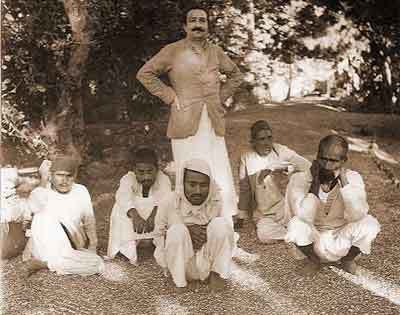 Meher Baba traveled throughout India helping masts–spiritually intoxicated souls
Meher Baba traveled throughout India helping masts–spiritually intoxicated souls“The progressive manifestation of life through evolution is ultimately brought about by the will-to-be conscious, which is inherent in the Infinite. … Whether the act of manifestation is looked upon as a sort of expansion of Reality or as its timeless contraction, it is preceded by an initial urge or movement, which might (in terms of thought) be regarded as an inherent and latent desire to be conscious.”
– Meher Baba, Discourses, p34-35
“Within the undifferentiated being of the Absolute is born the mysterious point (the Om Point) through which comes forth the variegated manyness of creation.”
– Meher Baba, Discourses, p34
“The work of the Perfect Masters in the universe is fundamentally different from the kind of thing most priests or clergy of established religions aspire to. Most of them attach too much importance to external forms, rituals, and conformity. Since they themselves are not free from selfishness, narrowness or ignorance, they exploit the weak and the credulous by holding before them the fear of hell or the hope of heaven. The Perfect Masters, on the other hand, have entered forever into the eternal life of love, purity, universality and understanding. They are are therefore concerned only with the things that really matter and which eventually bring about the inner unfoldment of spirit in all whom they help.”
– Meher Baba, Discourses, p283
“Those who are themselves in ignorance may, out of self-delusion or deliberate selfishness, use the same language as that of the Masters; and they may try to imitate them in many of the external things associated with the life of the Masters.”
– Meher Baba, Discourses, p283
“The hypocrite, however, knows that he does not know and pretends to be what he is not for selfish reasons. In doing so he creates a serious karmic binding for himself. Though he is a source of considerable danger to the weak and the credulous, he cannot go on indefinitely with his willful deceit, for in the course of time he is automatically exposed by some claim which he is unable to substantiate.”
– Meher Baba, Discourses, p283-284
God Speaks by Meher Baba
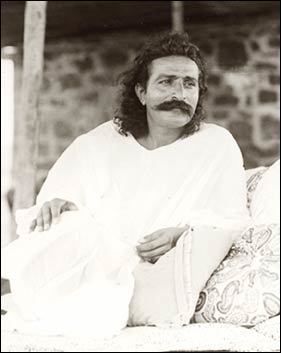 In God Speaks, Meher Baba explains the soul’s journey through creation
In God Speaks, Meher Baba explains the soul’s journey through creation“Only so long as man’s ignorance lasts will there seem to be no end to the plural diversity of illusory things. When divine knowledge is gained he realizes that there is no end to the indivisible oneness of God.”
– Meher Baba, God Speaks, p68
“On the one hand, God, and the capacity of man to see and become one with God, are always there. On the other hand, Truth remains hidden from man until he actually arrives upon the path or realizes God. This apparent anomaly is due to two different factors: man’s ignorance of Truth, and the fact that Truth is beyond the faculty of reason and far, far above the sphere of intellect.”
– Meher Baba, God Speaks, p68
“There are always, at all times and in all ages, fifty-six God realized souls or Shiv-Atmas in human form on earth; and out of these fifty-six only eight have public recognition.”
– Meher Baba, God Speaks, p256
“Truth can only be known after one transcends the cosmic illusion which appears as real owing to Maya.”
– Meher Baba, God Speaks, section 35, p270
“One should live in the world, perform all legitimate duties and yet feel mentally detached from everything. One should be in the world but not of it.”
– Meher Baba, God Speaks, p195
“The illusion which most aspirants find difficult to shake is the belief that infinite Truth is an object which has to be attained in some distant future, and that all life is just a means for this attainment. . . . Life is not meant to be rich in spiritual significance at some distant date, but it is so at every moment, if the mind is disburdened of illusions.”
– Meher Baba, God Speaks, p118
“To understand the infinite, eternal Reality is not the goal of individualized beings in the Illusion of Creation, because the Reality can never be understood; it is to be realized by conscious experience.”
– Meher Baba, God Speaks
“In short, there are always, at all times and in all ages, fifty-six God-realized souls or Shiv-Atmas in human form on the earth.”
– Meher Baba, God Speaks, p150
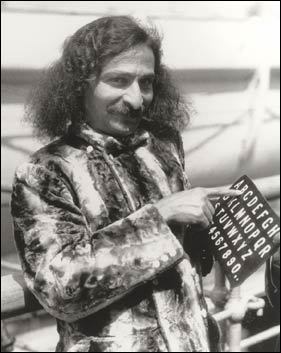 Meher Baba maintained silence and communicated using an alphabet board
Meher Baba maintained silence and communicated using an alphabet board“As compared with dreams, the physical life is indeed a reality. Similarly, compared with the reality of the path, the world and all worldly life is vacant dreaming on the part of man. But as the world and all of its experiences are illusory, so is the spiritual path that leads to Reality. The former may be termed false illusion and the latter real illusion. Nevertheless, despite the vast difference between them, they are both illusions, for God alone is the only Reality.”
– Meher Baba, God Speaks, p68
“God cannot be explained, He cannot be argued about, He cannot be theorized, nor can He be discussed and understood. God can only be lived.”
– Meher Baba, God Speaks, p190
“It necessarily follows that while this gross–conscious God in the man state experiences the opposites in the gross world, He reincarnates a number of times, sometimes as a male, sometimes as a female, in the varied castes, creeds, nationalities and colours and in varied different places and continents, always reviewing opposite impressions and exhausting them by experiences of opposites.”
– Meher Baba, “God Speaks, p. 112–113
“Not only is nonreaction to adverse circumstances essential, but also non-reaction to favorable and pleasurable circumstances. Of these two the latter is the harder and is less often described, although it matters just as much.”
– Meher Baba, God Speaks, p201
“The consciousness of the soul therefore utilizes this perfect medium to experience and completely exhaust all impressions so that the fully conscious soul becomes devoid of any impression whatsoever, and thus is able to realize its own real, eternal and infinite state in the Over-Soul.”
– Meher Baba, God Speaks, p8-27
“A soul becomes perfect after passing through evolution, reincarnation and the process of realization.”
– Meher Baba, God Speaks, p220
Beams from Meher Baba on the Spiritual Panorama by Meher Baba
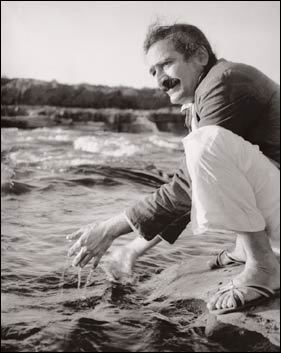 Meher Baba, an incarnation of the divine, was with us in the last century
Meher Baba, an incarnation of the divine, was with us in the last century“Thus the consciousness gained by the unconscious soul, instead of experiencing reality through unity and identity with the Over-Soul, experiences illusion through duality and identity with the gross form, multiplying diverse, innumerable impressions in a series of experiences while associating with the gross form and gradually gaining or evolving more and more consciousness.”
– Meher Baba, God Speaks, p11
“The whole world is pining for light and freedom. To meet this recurrent and poignant demand there always arises a plentiful supply of those who claim to meet it adequately. Most of the claimants are impostors. Those who can meet the demand adequately are extremely rare.”
– Meher Baba, Beams from Meher Baba on the Spiritual Panorama, p49
“Conscious and deliberate impostors in the field of spirituality are at once the most confirmed culprits and the most piteous victims. They get stuck deeper and deeper in the quagmire of their own creation until everyone, including themselves, loses all hope of their redemption.”
– Meher Baba, Beams from Meher Baba on the Spiritual Panorama, p51
“The world or creation comes out of the eternal and infinite being of God through the creation-point, which is referred to as “Om.” No one can attain lasting peace unless he contacts and transcends this Om point. We therefore find the sacred symbol Om often appearing in juxtaposition with the word “Shantih,” which means peace.
The phonetic similarity between Om, Amin and Amen is suggestive of many things. The sacred words Amin and Amen are frequent at the end of Muslim and Christian prayers. They both mean “So be it”. Coming from a man, “So be it” is a blessing or a wish; but coming from God it is creation. Creation is God’s Amin or Amen, i.e., an immediate and instantaneous fulfilling of His will into actuality. The Arabic word Amin comes from the root Omn, which means safety or peace and thus Amin may be regarded as an equivalent or at least a kin of Om, which also is associated with peace.”
– Meher Baba, Beams from Meher Baba on the Spiritual Panorama, p18-19 pdf
Lord Meher by Bhau Kalchuri
“God has been everlastingly working in silence, unobserved, unheard, except by those who experience His Infinite Silence.”
– Meher Baba, Lord Meher, Chapter 22
The Path of Love by Meher Baba
“A person of a particular plane of consciousness reincarnates as of that respective plane of consciousness and, then gradually gets established in the plane of consciousness of his previous life. He may or may not make further progress in the planes of higher consciousness. Progress will depend on the help of a spiritual guide of a higher plane, on the grace of a Perfect Master, or on his own efforts.”
– Meher Baba, The Path of Love, p84
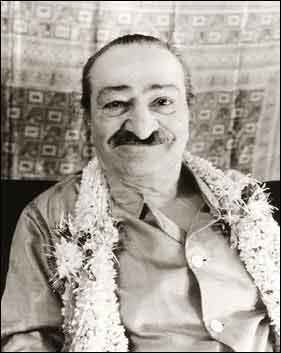 Meher Baba dropped the body in 1968
Meher Baba dropped the body in 1968“Love is dynamic in action and contagious in effect. Pure love is matchless in majesty; it has no parallel in power and there is no darkness it cannot dispel. It is the undying flame that has set life aglow. The lasting emancipation of man depends upon his love for God and upon God’s love for one and all.”
– Meher Baba, The Path of Love, p67
“Of all the forces that can best overcome all difficulties, is the force of love, because the greatest Law of God is Love, which holds the key to all problems. This mighty force not only enables one to put the ideal of selfless service into practice, but also transforms one into God. It has been possible through love for man to become God; and when God; and when God becomes man, it is also due to His Love for His beings.”
– Meher Baba, The Path of Love, p67
“To realize God, we must love Him, losing ourselves in His Infinite Self.”
– Meher Baba, The Path of Love, p70-71
Infinite Intelligence by Meher Baba
“Sanskaras are both the cause and content of all experience.”
– Meher Baba, Infinite Intelligence, p230
“Sanskaras give rise to false thinking, which creates the illusion of Maya.” – Meher Baba, Infinite Intelligence, p42
“Maya makes this universe, which is false, appear as real.”
– Meher Baba, Infinite Intelligence, p134
“Sanskaras give rise to experience, which in turn generates new impressions.”
– Meher Baba, Infinite Intelligence, p230
“Though man is capable of realizing the Self, he is prevented from doing so by sanskaras.”
– Meher Baba, Infinite Intelligence, p125
The post Meher Baba Quotes appeared first on The Spiritual Journey.
October 31, 2019
Jesus Christ Quotes
This page includes some of my favorite quotes from Jesus Christ.

“I am the Light of the world; he who follows Me will not walk in the darkness, but will have the Light of life.”
– Jesus Christ, The Holy Bible, John 8:12
“Ask, and it shall be given you; seek, and ye shall find; knock, and it shall be opened unto you.”
– Jesus Christ, The Holy Bible, Matthew 7:7
“Because of your unbelief: for verily I say unto you, If ye have faith as a grain of mustard seed, ye shall say unto this mountain, Remove hence to yonder place; and it shall remove; and nothing shall be impossible unto you.”
– Jesus Christ, The Holy Bible, Matthew 17:20
“Beware of false prophets, which come to you in sheep’s clothing, but inwardly they are ravening wolves.”
– Jesus Christ, The Holy Bible, Matthew 7:15
“With men this is impossible; but with God all things are possible.”
– Jesus Christ, The Holy Bible, Matthew 19:26
“He was a murderer from the beginning, and abode not in the truth, because there is no truth in him. When he speaketh a lie, he speaketh of his own: for he is a liar, and the father of it.”
– Jesus Christ, The Holy Bible, John 8:44
“With men this is impossible; but with God all things are possible.”
– Jesus Christ, The Holy Bible, Matthew 19:26
 Jesus appeared several times before Paramahansa Yogananda, who said that painting was a close resemblance of Jesus.
Jesus appeared several times before Paramahansa Yogananda, who said that painting was a close resemblance of Jesus.“You will know the truth, and the truth will set you free.”
– Jesus Christ, The Holy Bible, John 8:32
“But Jesus beheld them, and said unto them, With men this is impossible; but with God all things are possible.”
– Jesus Christ, The Holy Bible, Matthew 19:26
“And Jesus said unto them, Because of your unbelief: for verily I say unto you, If ye have faith as a grain of mustard seed, ye shall say unto this mountain, Remove hence to yonder place; and it shall remove; and nothing shall be impossible unto you.”
– Jesus Christ, The Holy Bible, Matthew 17:20
“Neither shall they say, Lo here! or, lo there! for, behold, the kingdom of God is within you.”
– Jesus Christ, The Holy Bible, Luke 17:21
“But seek ye first the kingdom of God, and his righteousness; and all these things shall be added unto you.”
– Jesus Christ, The Holy Bible, Matthew 6:33
“And thou shalt love the Lord thy God with all thy heart, and with all thy soul, and with all thy mind, and with all thy strength: this is the first commandment.”
– Jesus Christ, The Holy Bible, Mark 12:30
“For whosoever hath, to him shall be given, and he shall have more abundance: but whosoever hath not, from him shall be taken away even that he hath.”
– Jesus Christ, The Holy Bible, Matthew 13:12
The post Jesus Christ Quotes appeared first on The Spiritual Journey.
October 30, 2019
Eckhart Tolle Quotes
This page includes some of my favorite quotes from Eckhart Tolle. They are organized by the book in which they are found.
The Power of Now by Eckhart Tolle
 Eckhart Tolle is one of the few famous spiritual teachers who is actually enlightened.
Eckhart Tolle is one of the few famous spiritual teachers who is actually enlightened.“Incessant mental noise prevents you from finding that realm of inner stillness that is inseparable from Being. It also creates a false mind-made self that casts a shadow of fear and suffering.”
– Eckhart Tolle, The Power of Now, p15
“The compulsive thinker, which means almost everyone, lives in a state of apparent separateness, in an insanely complex world of continuous problems and conflict, a world that reflects the ever-increasing fragmentation of the mind.”
– Eckhart Tollem, The Power of Now, p15
“Enlightenment is a state of wholeness, of being ‘at one’ and therefore at peace. At one with life in its manifested aspect, the world, as well as with your deepest self and life unmanifested—at one with Being.”
– Eckhart Tolle, The Power of Now, p15
“Identification with your mind creates an opaque screen of concepts, labels, images, words, judgments, and definitions that blocks all true relationship. It comes between you and yourself, between you and your fellow man and woman, between you and nature, between you and God. It is this screen of thought that creates the illusion of separateness, the illusion that there is you and a totally separate other.”
– Eckhart Tolle, The Power of Now, p15
“The beginning of freedom is the realization that you are not the possessing entity—the thinker. Knowing this enables you to observe the entity. The moment you start watching the thinker, a higher level of consciousness becomes activated. You then begin to realize that there is a vast realm of intelligence beyond thought, that thought is only a tiny aspect of that intelligence. You also realize that all the things that truly matter—beauty, love, creativity, joy, inner peace—arise from beyond the mind. You begin to awaken.”
– Eckhart Tolle, The Power of Now, p17
We may call this phantom self the ego. It consists of mind activity and can only be kept going through constant thinking. The term ego means different things to different people, but when I use it here it means a false self, created by unconscious identification with the mind.” – Eckhart Tolle, The Power of Now, p22
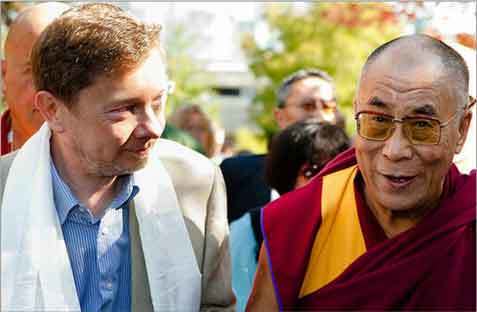 Eckhart Tolle visits the Dalai Lama
Eckhart Tolle visits the Dalai Lama“True salvation is fulfillment, peace, life in all its fullness. It is to be who you are, to feel within you the good that has no opposite, the joy of Being that depends on nothing outside itself. It is felt not as a passing experience but as an abiding presence. In theistic language, it is to “know God”—not as something outside you but as your own innermost essence. True salvation is to know yourself as an inseparable part of the timeless and formless One Life from which all that exists derives its being.”
– Eckhart Tolle, The Power of Now, p146
“True salvation is a state of freedom—from fear, from suffering, from a perceived state of lack and insufficiency and therefore from all wanting, needing, grasping, and clinging. It is freedom from compulsive thinking, from negativity, and above all from past and future as a psychological need.”
– Eckhart Tolle, The Power of Now, p146
“You mind is telling you that you cannot get there from here. Something needs to happen, or you need to become this or that before you can be free and fulfilled. It is saying, in fact, that you need time—that you need to find, sort out, do, achieve, acquire, become, or understand something before you can be free or complete. You see time as a means to salvation, whereas in truth it is the greatest obstacle to salvation. You think that you can’t get there from where you are at this moment because you are not yet complete or good enough, but the truth is that here and now is the only point from where you can get there. You “get” there by realizing that you are there already.”
– Eckhart Tolle, The Power of Now, p146-147
“As long as you are identified with the mind, yo have an externally derived sense of self. That is to say, you get your sense of who you ar from things that ultimately have nothing to do with who you are: your social role, possessions, external appearance, successes and failures, belief systems, and so on. This false, mind-made self, the ego, feels vulnerable, insecure, and is always seeking new things to identify with to give it a feeling that it exists. But nothing is ever enough to give it lasting fulfillment. Its fear remains; its sense of lack and neediness remains.”
– Eckhart Tolle, The Power of Now, p150-151
“All true artists, whether they know it or not, create from a place of no-mind, from inner stillness. The mind then gives form to the creative impulse or insight. Even the great scientists have reported that their creative breakthroughs came at a time of mental quietude. – Eckhart Tolle, The Power of Now, p24
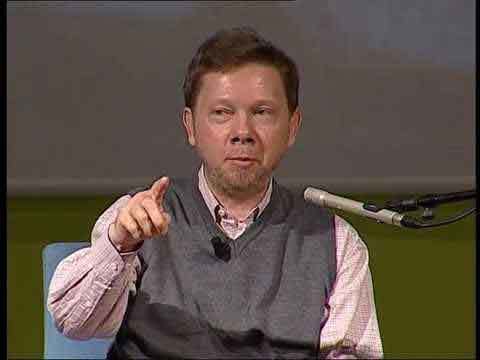 Eckhart Tolle travels the world teaching to large crowds of seekers.
Eckhart Tolle travels the world teaching to large crowds of seekers. “If in your relationship you experience both ‘love’ and the opposite of love—attack, emotional violence, and so on—then it is likely that you are confusing ego attachment and addictive clinging with love. You cannot love your partner one moment and attack him or her the next. True love has no opposite. If your ‘love’ has an opposite, then it is not love but a strong ego-need for a more complete and deeper sense of self.”
– Eckhart Tolle, The Power of Now, p151-152
“To know yourself as the Being underneath the thinker, the stillness underneath the mental noise, the love and joy underneath the pain, is freedom, salvation, enlightenment.”
– Eckhart Tolle, The Power of Now, p154
“Love is a state of Being. Your love is not outside; it is deep within you. You can never lose it, and it cannot leave you. It is not dependent on some other body, some external form.”
– Eckhart Tolle, The Power of Now, p154
“In the stillness of your presence, you can feel your own formless and timeless reality as the unmanifested life that animates your physical form. You can then feel the same life deep within every other human and every other creature. You look beyond the veil of form and separation. This is the realization of oneness. This is love.”
– Eckhart Tolle, The Power of Now, p154-155
“Love is not selective, just as the light of the sun is not selective. It does not make one person special. It is not exclusive. Exclusivity is not the love of God but the ‘love’ of ego.”
– Eckhart Tolle, The Power of Now, p155
“Happiness depends on conditions being perceived as positive; inner peace does not.”
– Eckhart Tolle, The Power of Now, p177
“Whenever anything negative happens to you, there is a deep lesson concealed within it, although you may not see it at the time. Even a brief illness or an accident can show you what is real and unreal in your life, what ultimately matters and what doesn’t.”
– Eckhart Tolle, The Power of Now, p177-178
 Eckhart Tolle popularized the Zen practice of focusing on the present moment.
Eckhart Tolle popularized the Zen practice of focusing on the present moment.“The greater part of human pain is unnecessary. It is self-created as long as the unobserved mind runs your life. The pain that you create now is always some form of nonacceptance, some form of unconscious resistance to what is. On the level of thought, the resistance is some form of judgment. On the emotional level, it is some form of negativity. The intensity of the pain depends on the degree of resistance to the present moment, and this in turn depends on how strongly you are identified with your mind.”
– Eckhart Tolle, The Power of Now p33
“The more you are able to honor and accept the Now, the more you are free of pain, of suffering – and free of the egoic mind.”
– Eckhart Tolle, The Power of Now, p33
“Not to be able to stop thinking is a dreadful affliction, but we don’t realize this because almost everybody is suffering from it, so it is considered normal.”
– Eckhart Tolle, The Power of Now, p14
“Space and silence are two aspects of the same thing, the same no-thing. They are an externalization of inner space and inner stillness, which is stillness: the infinitely creative womb of all existence.”
– Eckhart Tolle, The Power of Now, p139
“Direct your attention into the body. Feel it from within. Is it alive? Is there life in your hands, arms, legs, and feet – in your abdomen, you chest? Can you feel the subtle energy field that pervades the entire body and gives vibrant life to every organ and every cell? Can you feel it simultaneously in all parts of the body as a single field of energy?” – Eckhart Tolle, The Power of Now, p112
A New Earth by Eckhart Tolle
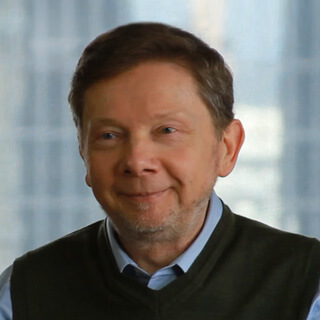 Eckhart Tolle is an awakened, modern spiritual teacher
Eckhart Tolle is an awakened, modern spiritual teacher“Thought can at best point to the truth, but it never is the truth.”
– Eckhart Tolle, A New Earth, p70
“Any conceptual sense of self—seeing myself as this or that—is ego, whether predominately positive (I am the greatest) or negative (I am no good).”
– Eckhart Tolle, A New Earth, p86
The post Eckhart Tolle Quotes appeared first on The Spiritual Journey.
October 29, 2019
Sri Aurobindo Quotes
This page includes some of my favorite quotes from Sri Aurobindo. They are organized by the book in which they are found.
The Integral Yoga by Sri Aurobindo
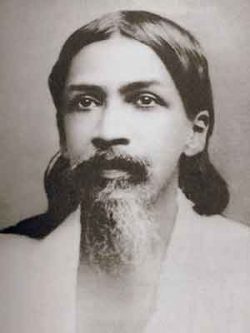
“The ascent of the human soul to the supreme Spirit is that soul’s highest aim and necessity, for that is the supreme reality; but there can be too the descent of the Spirit and its powers into the world and that would justify the existence of the material world also, give a meaning, a divine purpose to the creation and solve its riddle.”
– Sri Aurobindo, The Integral Yoga, p44-45
“Karma from the past lives exists, much of what happens is due to it, but not all. For we can mend our karma by our consciousness and efforts.”
– Sri Aurobindo, The Integral Yoga, p344
“The first process of Yoga is therefore to open the ranges of this inner being and to live from there outward, governing his outward life by an inner light and force. In doing so he discovers in himself his true soul which is not this outer mixture of mental, vital and physical elements but something of the Reality behind them, a spark from the one Divine Fire.”
– Sri Aurobindo, The Integral Yoga, p4
“The Master is one who has risen to a higher consciousness and being and he is often regarded as its manifestation or representative. He not only helps by his teaching and still more by his influence and example but by a power to communicate his own experience to others.”
– Sri Aurobindo, The Integral Yoga, p5
“It is a fact always known to all yogis and occultists since the beginning of time, in Europe and Africa as in India, that wherever yoga or Yajna is done, there the hostile Forces gather together to stop it by any means.”
– Sri Aurobindo, The Integral Yoga, p280
“This yoga is a spiritual battle; its very attempt raises all sorts of adverse forces and one must be ready to face difficulties, sufferings, reverses of all sorts in a calm unflinching spirit. The difficulties that come are ordeals and tests and if one meets them in the right spirit, one comes out stronger and spiritually purer and greater.”
– Sri Aurobindo, The Integral Yoga, p282
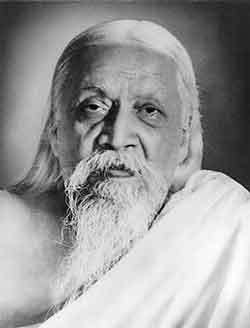 Later in life, Sri Aurobindo went into seclusion to finish his spiritual work.
Later in life, Sri Aurobindo went into seclusion to finish his spiritual work.“All who enter the spiritual path have to face the difficulties and ordeals of the path, those which arise from their own nature and those which come in from the outside.”
– Sri Aurobindo, The Integral Yoga, p273
“It is necessary to observe and know the wrong movements in you; for they are the source of your trouble and have to be persistently rejected if you are to be free. But do not be always thinking of your defects and wrong movements. Concentrate more upon what you are to be, on the ideal, with the faith that, since it is the goal before you, it must and will come. To be always observing faults and wrong movements brings depression and discourages the faith. Turn your eyes more to the coming light and less to any immediate darkness. Faith, cheerfulness, confidence in the ultimate victory are the things that help – they make the progress easier and swifter.”
– Sri Aurobindo, The Integral Yoga, p279
“The desire for the Divine or for the bhakti for the Divine is the one desire which can free one from all other desires – at the core it is not a desire but an aspiration, a soul need, the breath of existence of the inmost being, and as such it cannot be counted among desires.”
– Sri Aurobindo, The Integral Yoga, p295
“In our Yoga we begin with the idea, the will, the aspiration of the complete surrender; but at the same time we have to reject the lower nature, deliver our consciousness from it, deliver the self involved in the lower nature by the self rising to freedom in the higher nature.”
– Sri Aurobindo, The Integral Yoga, p29
The Upanishads by Sri Aurobindo
“It is the same Lord who dwells in the sum and the part, in the Cosmos as a whole and in each being, force or object in the Cosmos. Since He is one and indivisible, the Spirit in all is one and their multiplicity is a play of His cosmic consciousness. Therefore each human being is in his essence one with all others, free, eternal, immutable, lord of Nature.”
– Sri Aurobindo, The Upanishads, p30
The Mother by Sri Aurobindo
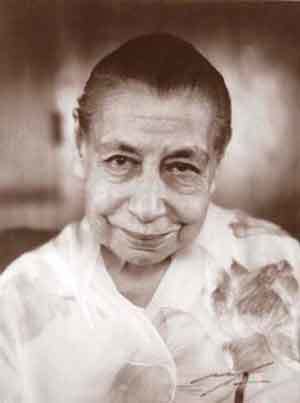 Aurobindo considered Mirra Alfassa to be his spiritual equal and referred to her as the Mother, a name he also used for the divine. She helped run his ashram in Pondicherry, India.
Aurobindo considered Mirra Alfassa to be his spiritual equal and referred to her as the Mother, a name he also used for the divine. She helped run his ashram in Pondicherry, India.“Calling on God to do everything and save one all the trouble and struggle is a deception and does not lead to freedom and perfection.”
– Sri Aurobindo, The Mother, p7
“Note that a tamasic surrender refusing to fulfill the conditions and calling on God to do everything and save one all the trouble and struggle is a deception and does not lead to freedom and perfection.”
– Sri Aurobindo, The Mother, p7
“The supramental change is a thing decreed and inevitable in the evolution of the earth-consciousness; for its upward ascent is not ended and mind is not its last summit. But that the change may arrive, take form and endure, there is needed the call from below with a will to recognize and not deny the Light when it comes, and there is needed the sanction of the Supreme from above. The power that mediates between the sanction and the call is the presence and power of the Divine Mother.”
– Sri Aurobindo, The Mother, p26
The post Sri Aurobindo Quotes appeared first on The Spiritual Journey.
October 28, 2019
Paramahansa Yogananda Quotes
This page includes some of my favorite sayings by Paramahansa Yogananda. They are organized by the book in which they are found.
Autobiography of a Yogi by Paramahansa Yogananda
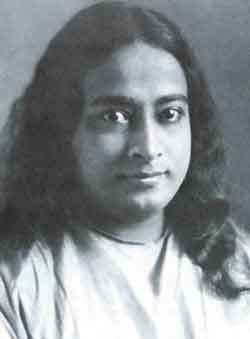
“Intuition is soul guidance, appearing naturally in man during those instants when his mind is calm.”
– Paramahansa Yogananda, Autobiography of a Yogi, p124
“The power of unfulfilled desires is the root of all man’s slavery.”
– Paramahansa Yogananda, Autobiography of a Yogi
“Anyone who practices a scientific technique for divine realization is a yogi. He may be either married or unmarried either a man of worldly responsibilities or one of formal religious ties.”
– Paramahansa Yogananda, Autobiography of a Yogi, p251
A yogi engages himself in a definite, step-by-step procedure by which the body and mind are disciplined and the soul gradually liberated. Taking nothing for granted on emotional grounds or by faith, a yogi practices a thoroughly tested series of exercises that were first mapped out by the ancient rishis.
– Paramahansa Yogananda, Autobiography of a Yogi, p251
“Yoga is a method for restraining the natural turbulence of thoughts, which otherwise prevents all men…from glimpsing their true nature of Spirit…The thoughts of most persons are restless and capricious; a manifest need exists for yoga: the science of mind control.”
– Paramahansa Yogananda, Autobiography of a Yogi, p251
“Fulfilling one’s earthly responsibilities need not separate man from God, provided he maintains mental uninvolvement with egotistical desires and plays his part in life as a willing instrument of the Divine.”
– Paramahansa Yogananda, Autobiography of a Yogi, p253
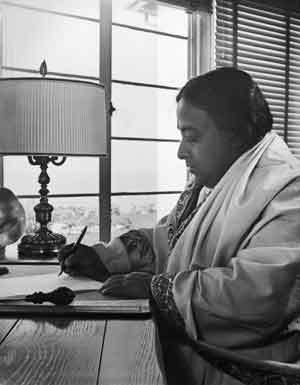 Paramahansa Yogananda wrote Autobiography of a Yoga in his residence in Encinitas, CA
Paramahansa Yogananda wrote Autobiography of a Yoga in his residence in Encinitas, CA“In the initial states of God-communion (savikalpa Samadhi) the devotee’s consciousness merges in the Cosmic Spirit; his life force is withdrawn from the body, which appears “dead”, or motionless and rigid. The yogi is fully aware of his bodily condition of suspended animation. As he progresses to higher spiritual states (nirvikalpa Samadhi)…he communes with God without bodily fixation; and in his ordinary waking consciousness, even in the midst of exacting worldly duties.”
– Paramahansa Yogananda, Autobiography of a Yogi, p266
“In men under maya or natural law, the flow of life energy is toward the outward world; the currents are wasted and abused in the senses. The practice of Kriya reverses the flow; life force is mentally guided to the inner cosmos and becomes reunited with subtle spinal energies.”
– Paramahansa Yogananda, Autobiography of a Yogi, p269
“Each man’s intellectual reactions, feelings, moods, and habits are merely effects of past causes, whether of this or a prior life.”
– Paramahansa Yogananda, Autobiography of a Yogi, p272
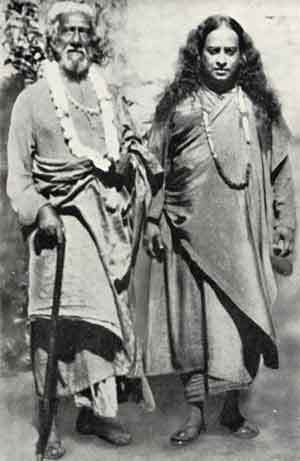 Paramahansa Yogananda was sent to the west by his spiritual teacher Sri Yuketswar. After his death Yuketswar appeared to Yogananda to explain what happens to a soul after it drops the physical body.
Paramahansa Yogananda was sent to the west by his spiritual teacher Sri Yuketswar. After his death Yuketswar appeared to Yogananda to explain what happens to a soul after it drops the physical body.“The adhesive force by which all three bodies are held together is desire. The power of unfulfilled desires is the root of all man’s slavery.”
– Sri Yukteswar, Autobiography of a Yogi, p316
“So long as the soul of man is encased in one, two, or three body- containers, sealed tightly with the corks of ignorance and desires, he cannot merge with the sea of Spirit. When the gross physical receptacle is destroyed by the hammer of death, the other two coverings-astral and causal-still remain to prevent the soul from consciously joining the Omnipresent Life. When desirelessness is attained through wisdom, its power disintegrates the two remaining vessels. The tiny human soul emerges, free at last; it is one with the Measureless Amplitude.”
– Sri Yukteswar, Autobiography of a Yogi, p316
God Talks with Arjuna by Paramahansa Yogananda
“Births and deaths are inevitable for man only during the state of ignorance in which he thinks he is the body and cannot exist without it. Only the man who will not seek the awakening of wisdom must suffer the nightmares and delusive dreams of births and deaths and the fanciful miseries and limitations attending them.”
– Paramahansa Yoganda, “God Talks With Arjuna”
“The spiritual man performs all right actions of seeing, touching, smelling, tasting, and hearing without feeling any mental attachment. His soul floats on the foul waters of dark earthly experiences—of man’s sad indifference to God—like an unsoiled lotus arising from the muddy waters of a lake.”
– Paramahansa Yogananda, God Talks With Arjuna
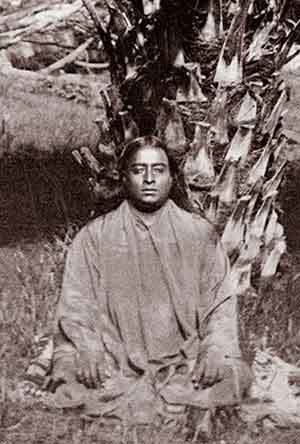 Paramahansa Yogananda taught the meditation practice of kriya yoga
Paramahansa Yogananda taught the meditation practice of kriya yoga“Freed from the intoxications of delusion and delusive mortal limitations, the superman knows his earthly name and possessions, but is never possessed or limited by them. Living in the world he is not of the world. He is aware of hunger, thirst, and other conditions of the body but his inner consciousness identifies itself, not with the body, but with Spirit. The advanced yogi may own many possessions, but will never sorrow if all things are taken away. If he happens to be materially poor, he knows that, in Spirit, he is rich beyond all dreams of avarice.”
– Paramahansa Yogananda, God Talks With Arjuna
“God manifests in creation as the
Cosmic Vibration, which expresses itself as Cosmic Sound and Cosmic Light.”
–
Paramahansa Yogananda, God Talks with Arjuna, p614
“Aum, being a spiritual vibration, is not heard physically, but felt spiritually.”
– Paramahansa Yogananda, God Talks with Arjuna, p614-616.
The Second Coming of Christ by Paramahansa Yogananda
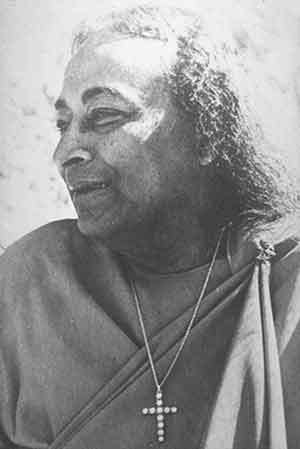 Paramahansa Yogananda wrote about his close relationship with Jesus in his book The Second Coming of Christ
Paramahansa Yogananda wrote about his close relationship with Jesus in his book The Second Coming of Christ“Evil resides in the Adversarial Force that maintains its realm of influence by the gross obscuration of the true God-nature of all created beings.”
– Paramahansa Yogananda, The Second Coming of Christ, p143
“It is better to know all the lures of evil and the ways to combat them than to be blind and deny their existence. Knowledge only, and not indifference, can produce final emancipation.”
– Paramahansa Yogananda, The Second Coming of Christ, p37
“Angels are God-ordained heavenly beings who serve God’s purposes throughout creation. They are either personified powers or qualities of God, or are fully liberated souls in whose beings the perfect spirit of God is encased. The latter, having overcome both material and heavenly desires and attachments, have merged in Spirit and then reemerged in bodies of pure energy—omnipotent, omniscient forces of the Divine Will.”
– Paramahansa Yogananda, Th Second Coming of Christ, p210-211
“The vibratory force emanating from Spirit, endowed with the illusory creative power of maya, is the Holy Ghost: Cosmic Vibration, the Word, Aum (Om) or Amen. All things, all created planets and living beings in the Holy Ghost, or Holy Vibration are nothing but the frozen imagination of God. This Holy Ghost in the Hindu Scriptures is called the Aum or Maha-prakriti (Great Nature, the Cosmic Mother that gives birth to all creation); by the scientists, the structure of matter, its tissue or material, is also knows to a lesser degree, as cosmic vibration.”
– Paramahansa Yogananda, The Second Coming of Christ, p11
“In order to give individuality and independence to Its thought images, Spirit had to employ a cosmic deception, a universal mental magic…There God is active as the creative Vibratory Holy Ghost with its immanent Christ Consciousness.”
– Paramahansa Yogananda, The Second Coming of Christ, p140
Where There is Light by Paramahansa Yogananda
“Tune yourself with the creative power of Spirit. You will be in contact with the Infinite Intelligence that is able to guide you and to solve all problems. Power from the dynamic Source of your being will flow uninterruptedly so that you will be able to perform creatively in any sphere of activity.”
– Paramahansa Yogananda, Where There is Light, p64
The post Paramahansa Yogananda Quotes appeared first on The Spiritual Journey.
September 15, 2019
Ramana Maharshi Quotes
This page includes some of my favorite sayings by Ramana Maharshi. They are organized by the book in which they were found.
Who Am I? by Ramana Maharshi
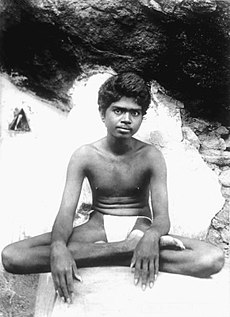 Ramana Maharshi in his youth when he answered the questions in the book Who am I?
Ramana Maharshi in his youth when he answered the questions in the book Who am I?“Whatever one does, one should do without the egoity ‘I’. If one acts in that way, all will appear as of the nature of Siva (God).”
–Ramana Maharshi, Who Am I?, answer 11
“What exists in truth is the Self alone. The world, the individual soul and God are appearances in it.”
–Ramana Maharshi, Who Am I?, answer 16
“All that one gives to others one gives to one’s self.”
–Ramana Maharshi, Who am I?, answer 14
“The thought ‘Who am I?’ will destroy all other thoughts, and like the stick used for stirring the burning pyre, it will itself in the end get destroyed. Then, there will arise Self-realization.”
–Ramana Maharshi, Who Am I?, answer 10
“When the world which is what-is-seen has been removed, there will be realization of the Self which is the seer.”
–Ramana Maharshi, Who Am I?, answer 4
Be As You Are by David Godman
“Renunciation is always in the mind, not in going to forests or solitary places or giving up one’s duties. The main thing is to see that the mind does not turn outward but inward.”
–Ramana Maharshi, Be As You Are, p198
“The state of Self-realization, as we call it, is not attaining something new or reaching some goal which is far away, but simply being that which you always are and which you always have been. All that is needed is that you give up your realization of the not-true as true.”
–Ramana Maharshi, Be As You Are, p18
 Arunachala mountain in Tirvannamalai, India where Ramana lived for 53 years
Arunachala mountain in Tirvannamalai, India where Ramana lived for 53 years Day by Day with Bhagavan by Devaraja Mudaliar
“The trouble with all of us is that we want to know the past, what we were, and also what we will be in the future. We know nothing about the past or the future. We do know the present and that we exist now. Both yesterday and tomorrow are only with reference to today. Yesterday was called ‘today’ in its time, and tomorrow will be called ‘today’ by us tomorrow. Today is ever present. What is ever present is pure existence. It has no past or future. Why not try and find out the real nature of the present and ever-present existence?”
–Ramana Maharshi, Day by Day with Bhagavan, 3-1-1946
“They have all taught the same truth but from different standpoints. Such differences were necessary to meet the needs of different minds differently constituted, but they all reveal the same truth.”
–Ramana Maharshi, Day by Day with Bhagavan, 3-7-1946
“You speak of paths as if you were somewhere and the Self somewhere else and you had to go and reach it. But in fact the Self is here and now and you are that always.”
–Ramana Maharshi, Day by Day with Bhagavan, 3-7-1946
“The state we call realization is simply being oneself, not knowing anything or becoming anything. If one has realized, he is that which alone is and which alone has always been. He cannot describe that state. He can only be that.”
–Ramana Maharshi, Day by Day with Bhagavan, 22-3-1946
“Of course, we loosely talk of Selfrealization, for want of a better term. How to ‘real-ize’ or make real that which alone is real? What we are all doing is, we ‘realized’ or regard as real that which is unreal. This habit of ours has to be given up. All sadhana under all systems of thought is meant only for this end. When we give up regarding the unreal as real, then the reality alone will remain and we will be that.”
–Ramana Maharshi, Day by Day with Bhagavan, 22-3-1946
“When we give up regarding the unreal as real, then the reality alone will remain and we will be that.”
–Ramana Maharshi, Day by Day with Bhagavan, 22-3-1946
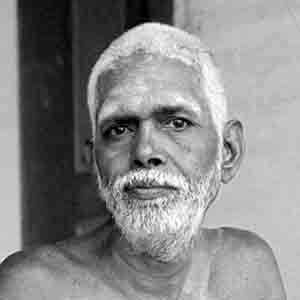
“Each should be allowed to go his own way, the way for which he alone may be built. It will not do to convert him to another path by violence. The Guru will go with the disciple along his own path and then gradually turn him into the supreme path when the time is right.”
–Ramana Maharshi, Day by Day with Bhagavan, 2-11-1945
“All these viewpoints are only to suit the capacity of the learner. The absolute can be only one”
–Ramana Maharshi, Day by Day with Bhagavan, 15-3-1946
“Those who have not the mental strength to concentrate or control their mind and direct it on the quest are advised to watch their breathing, since such watching will naturally and as a matter of course lead to cessation of thought and bring the mind under control.”
–Ramana Maharshi, Day by Day with Bhagavan, 1-12-1945
“There is only one state, that of consciousness or awareness or existence. The three states of waking, dream and sleep cannot be real. They simply come and go. The real will always exist. The `I’ or existence that alone persists in all the three states is real. The other three are not real and so it is not possible to say they have such and such a degree of reality. We may roughly put it like this. Existence or consciousness is the only reality. Consciousness plus waking, we call waking. Consciousness plus sleep, we call sleep. Consciousness plus dream, we call dream. Consciousness is the screen on which all the pictures come and go. The screen is real, the pictures are mere shadows on it. Because by long habit we have been regarding these three states as real, we call the state of mere awareness or consciousness the fourth. There is however no fourth state, but only one state.”
–Ramana Maharshi, Day by Day with Bhagavan, 11-1-1946
“There is no difference between dream and the waking state except that the dream is short and the waking long. Both are the result of the mind. Because the waking state is long, we imagine that it is our real state. But, as a matter of fact, our real state is turiya or the fourth state which is always as it is and knows nothing of the three states of waking, dream or sleep.”
–Ramana Maharshi, Day by Day with Bhagavan, 5-1-1946
“You may continue in your present method. When the japa becomes continuous, all other thoughts cease and one is in one’s real nature, which is japa or dhyana. We turn our mind outwards on things of the world and are therefore not aware of our real nature being always japa. When by conscious effort or japa or dhyana as we call it, we prevent our mind from thinking of other things, then what remains is our real nature, which is japa.
So long as you think you are name and form, you can’t escape name and form in japa also. When you realize you are not name and form, then name and form will drop off themselves. No other effort is necessary. Japa or dhyana will naturally and as a matter of course lead to it. What is now regarded as the means, japa, will then be found to be the goal. Name and God are not different.”
–Ramana Maharshi, Day by Day with Bhagavan, 9-3-1946
 Ramana Maharshi on his sofa in Ramana Ashram
Ramana Maharshi on his sofa in Ramana AshramGuru Ramana by S. S. Cohen
“There is neither past nor future. There is only the present. Yesterday was the present to you when you experienced it, and tomorrow will be also the present when you experience it. Therefore experience takes place only in the present, and beyond experience nothing exists.”
–Ramana Maharahi, Guru Ramana, p44
Maha Yoga by K. Lakshmana Sarma
“The Sage helps the world merely by being the real Self. The best way for one to serve the world is to win the Egoless State.”
–Ramana Maharshi, Maha Yoga, p230
Talks With Ramana Maharshi by by Munagala S. Venkataramiah
“It depends upon the temperament of the individual. Every person is born with the samskaras [karma] of past lives. One of the methods will be found easy for one person and another method for another. There is no definiteness about it.”
–Ramana Maharshi, Talks with Ramana Maharshi, Talk 580
“Divine Grace is essential for Realization. It leads one to God-realization. But such Grace is vouchsafed only to him who is a true devotee or a yogi, who has striven hard and ceaselessly on the path towards freedom.”
–Ramana Maharshi, Talks with Sri Ramana Maharshi, p34
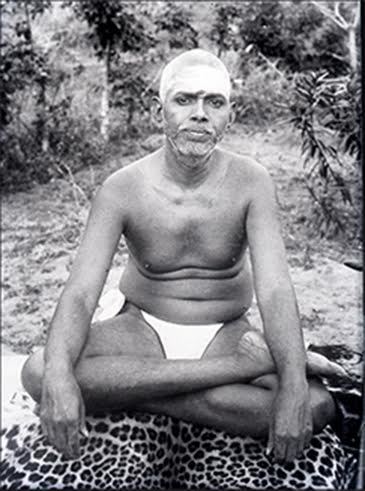
“The Self [Source] is not reached. You are the Self. You are already That. The fact is that you are ignorant of your blissful state. Ignorance supervenes and draws a veil over the pure Bliss. Attempts are directed only to remove this ignorance. This ignorance consists in wrong knowledge. The wrong knowledge consists in the false identification of the Self with the body, the mind, etc. This false identity must go and there remains the Self.”
–Ramana Maharshi, Talks with Sri Ramana Maharshi, Talk 251
“Surrender to Him and abide by His will whether he appears or vanishes; await His pleasure. If you ask Him to do as you please, it is not surrender but command to Him. You cannot have Him obey you and yet think that you have surrendered. He knows what is best and when and how to do it. Leave everything entirely to Him. His is the burden: you have no longer any cares. All your cares are His. Such is surrender. This is bhakti.”
–Ramana Maharshi, Talks with Sri Ramana Maharshi, Talk 450
“Love is not different from the Self. Love of an object is of an inferior order and cannot endure. Whereas the Self is Love, in other words, God is Love.”
–Ramana Maharshi, Talks with Ramana Maharshi, Talk 433
“Even one who is still practicing the path of Wisdom (jnana) can practice while engaged in work. It may be difficult in the earlier stages for a beginner, but after some practice it will soon be effective and the work will not be found a hindrance to meditation.”
–Ramana Maharshi, Talks With Sri Ramana Maharshi, Talk 17
“When women walk with water pots on their heads and chat with their companions they remain very careful, their thoughts concentrated on the loads on their heads. Similarly when a sage engages in activities, these do not disturb him because his mind abides in Brahman.”
–Ramana Maharshi, Talks with Sri Ramana Maharshi, Talk 231
“It is to be done by controlling the breath. If you practice it by yourself without other help, then the mind is controlled. Otherwise the mind comes under control spontaneously in the presence of a superior power. Such is the greatness of association with the wise (satsanga).”
–Ramana Maharshi, Talks with Sri Ramana Maharshi, Talk 10
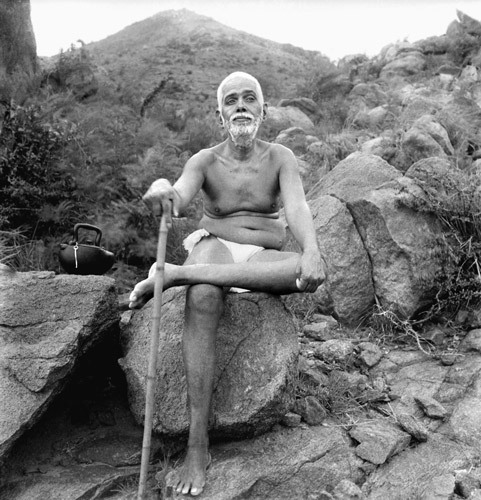 Ramana Maharshi on his daily walk on Arunachala mountain
Ramana Maharshi on his daily walk on Arunachala mountain“Uncertainties, doubts and fears are natural to everyone until the Self is realized. They are inseparable from the ego, rather they are the ego.”
–Ramana Maharshi, Talks with Sri Ramana Maharshi, Talk 162
“Surrender is to give oneself up to the original cause of one’s being. Do not delude yourself by imagining such source to be some God outside you. One’s source is within yourself. Give yourself up to it.”
–Ramana Maharshi, Talks with Sri Ramana Maharshi, Talk 208
“Reality is simply the loss of the ego. Destroy the ego by seeking its identity. Because the ego is no entity it will automatically vanish and Reality will shine forth by itself. This is the direct method. Whereas all other methods are done, only retaining the ego. In those paths there arise so many doubts and the eternal question remains to be tackled finally. But in this method the final question is the only one and it is raised from the very beginning. No sadhanas are necessary for engaging in this quest.”
–Ramana Maharshi, Talks with Sri Ramana Maharshi, Talk 146
“There is nothing to realize. It is nitya suddha buddha mukta (the Eternal, pure, aware and liberated) state. It is natural and eternal. There is nothing new to gain. On the other hand a man must loose his ignorance. That is all.”
–Ramana Maharshi, Talks with Sri Ramana Maharshi, Talk 104
“That which lies beyond the ego is consciousness – the Self.”
–Ramana Maharshi, Talks with Sri Ramana Maharshi, Talk 76
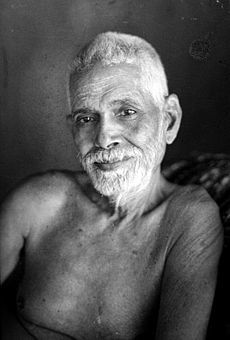
“The mind is a bundle of thoughts. The thoughts arise because there is the thinker. The thinker is the ego. The ego, if sought, will automatically vanish. The ego and the mind are the same. The ego is the root-thought from which all other thoughts arise.”
–Ramana Maharshi, Talks with Ramana Maharshi, Talk 347
“The realization is the result of the Master’s grace more than teachings, lectures, meditation, etc. They are only secondary aids, whereas the former is the primary cause.”
–Ramana Maharshi, Talks with Sri Ramana Maharshi, Talk 13
“Dhyana is concentration on an object. It fulfills the purpose of keeping away diverse thoughts and fixing the mind on a single thought, which must also disappear before Realization.”
–Ramana Maharshi, Talks with Sri Ramana Maharshi, Talk 63
“Upasana [meditation] helps concentration of mind. Then the mind is free from other thoughts and is full of the meditated form. The mind becomes it — and thus quite pure.”
–Ramana Maharshi, Talks with Sri Ramana Maharshi, Talk 390
“The mind is only a projection from the Self, appearing in the waking state. In deep sleep, you do not say whose son you are and so on. As soon as you wake up you say you are so and so, and recognize the world and so on. The world is only lokah, lokah (what is perceived is the world). That which is seen is lokah or the world. Which is the eye that sees it? That is the ego which rises and sinks periodically. But you exist always. Therefore That which lies beyond the ego is consciousness — the Self.
In deep sleep mind is merged and not destroyed. That which merges reappears.”
–Ramana Maharshi, Talks with Ramana Maharshi, Talk 76
“The jiva is said to remain in the Heart in deep sleep; and in the brain in the waking state.”
–Ramana Maharshi, Talks with Ramana Maharshi, Talk 29
“The same truth has to be experienced in different ways to suit the capacity of the hearer.”
–Ramana Maharshi, Teachings of Bhagavan Sri Ramana Maharshi, p142
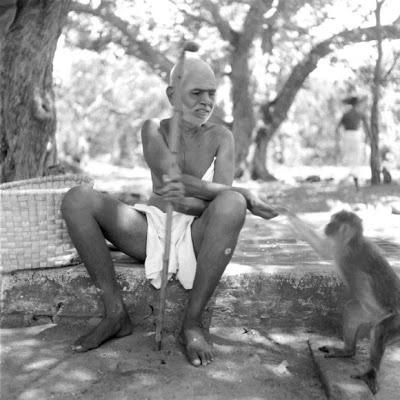 Ramana Maharshi was fond of all living beings and communicated with the monkeys at Ramana Ashram
Ramana Maharshi was fond of all living beings and communicated with the monkeys at Ramana AshramThe Teachings of Bhagavan Sri Ramana Maharshi in His Own Words by Arthur Osborne
“All religions postulate the three fundamentals: the world, the soul and God; but it is the One Reality that manifests itself as these three.”
–Ramana Maharshi, Teachings of Bhagavan Sri Ramana Maharshi, p36
Ulladu Narpadu by Ramana Maharshi
Since we know the world, we must concede for both a common Source, single but with the power of seeming many. The picture of names and forms, the onlooker, the screen, the light that illumines — all these are verily He.
–Ramana Maharshi, Ulladu Narpadu, verse 1
On three entities — the individual, God and the world — every creed is based. That ‘the One becomes the three’ and that ‘always the three are three’, are said only while the ego lasts. To lose the ‘I’ and in the Self to stay is the State Supreme.
–Ramana Maharshi, Ulladu Narpadu, verse 2
Muruganar
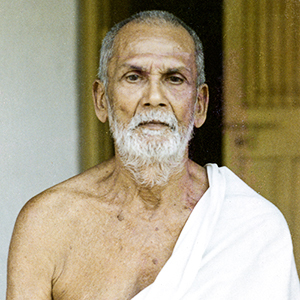
Muruganar was a prolific poet and writer who attained liberation through the grace of Ramana Maharshi.
Muruganar spent years in Sr Ramana Ashram listening to Ramana answer questions from devotees. He summarized many of the answers into four line verses which were then edited by Ramana Maharshi.
Some of Muruganar’s writings have been published in two books Guru Vachaka Kovai and Padamalai. Below are some of the passages from those books. They include summaries of Ramana’s talks as well as direct quotes by Ramana.
Guru Vachaka Kovai by Muruganar
“To the ignorant, who believe it to be real and revel in it, the world that appears before them is God’s creation, but to the steadfast jnanis, who have known the bondage-free Self by direct experience, it is merely a deluding and binding concept that is wholly mental.”
–Muruganar, Guru Vachaka Kovai, verse 21
“Do not be confounded by this worthless samsara that appears as a dream in the deluding [sleep of] ignorance. In a mind that has an intense desire for reality — consciousness, the supreme — it is impossible for the binding mental delusion that arises in the dense darkness of ignorance to remain.”
–Muruganar, Guru Vachaka Kovai, verse 27
“The worldly life is a dreamlike appearance, sapless and deluding, that functions through the mixture of the pairs of opposites such as desire and aversion. It appears as if real only as long as one is under the spell of the maya-sleep. It will end up being totally false when one truly wakes up into the maya-free Self.”
–Muruganar, Guru Vachaka Kovai, verse 41
“The world that veils the Self through names and forms, and appears to be real, is only a dream-like appearance. If, instead, that very same world gets veiled by the Self and appears as consciousness alone, then, as the Self, it too is real.”
–Muruganar, Guru Vachaka Kovai, verse 47
“All the differences that, crowding together, accumulate to form the world are in truth only the sport of grace, the power of the one consciousness. Therefore, jnani whose sole focus is the knowledge of the radiant reality will never perceive the world of many differences except as a mere appearance.”
–Muruganar, Guru Vachaka Kovai, verse 58
“Those who have known the truth as it really is will not declare this world, which is forever undergoing destruction by the wheel of time, to be real. Only the plenitude that shins uninterruptedly at all times and in all places, transcending time and space, is the nature of reality.”
–Muruganar, Guru Vachaka Kovai, verse 65
 Muruganar in the Sri Ramana Ashram with Ramana Maharshi
Muruganar in the Sri Ramana Ashram with Ramana Maharshi “Reach the Heart by clearly knowing your true nature and abide there permanently as that unattached Supreme Self, without slipping from the state of knowledge. Then, act according to the human role you have assumed, outwardly behaving as if, like all others in the world, you are experiencing joy and misery.”
–Muruganar, Guru Vachaka Kovai, verse 81
“The Self abides motionless because of its all-pervasive fullness. Because the apparent connection between the Self and the mind-limitation seems to exist on account of ignorance — which is the jiva-perspective, the reflected consciousness that rises as ‘I’ — the Self too appears to have experienced movement through the motion of the mind. But the movement of samsara that comprises birth and death, bondage and liberation, and so on, is only for the jiva and never for the Self, the transcendental reality.”
–Muruganar, Guru Vachaka Kovai, verse 94
“The world does not exist without the body; the body never at any time exists without the mind; the mind does not exist at all apart from consciousness; and consciousness too does not exist apart from being.” – Muruganar, “Guru Vachaka Kovai” verse 99
“The deeper intention of the scriptures in describing the sequence of creation in different ways is not to proclaim the correct theory of creation but to promote enquiry into the Supreme Reality that is the primal source of creation. This is the real puport behind the sastras [scriptures] that describe the details of creation.”
–Muruganar, Guru Vachaka Kovai, verse 102
“Since, through the enquiry ‘Who am I?’, the ego is destroyed in those who have known and reached the Heart that is the source of the rising ego, the dualistic pairs of opposing thoughts that exist depending on the ego, which together comprise the notion of bondage, are also totally destroyed. [Within such people] the darkness of ignorance that was the basis of the ego is also annihilated and they become the swarupa, the Supreme Self, the Heart that is eternally free of defilement. As the have attained the surging of the true and supreme bliss within themselves, at that very moment they are freed from the sorrow of birth.”
–Muruganar, Guru Vachaka Kovai, verse 260
“This is the definitive advice for those who desire to gain redemption: like the tortoise that retracts its five [limbs], restrain and withdraw the five senses, turn your mind towards the Self, and remain absorbed in it. This alone is happiness.”
–Muruganar, Guru Vachaka Kovai, verse 291
“Resolving that the world of names and forms, an imaginary concept, is only a dream in which not even one of the many things perceived exists apart from the perceiver, meditate on the blissful reality, the form of consciousness, without pursuing the world.” – Muruganar, “Guru Vachaka Kovai” verse 293
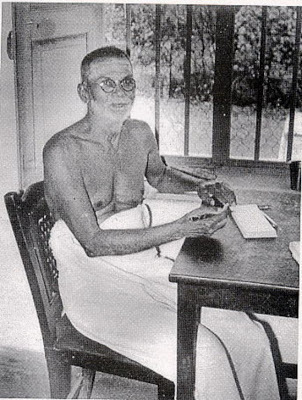 Murganar wrote exclusively about Ramana Maharshi
Murganar wrote exclusively about Ramana Maharshi“Like the one string that runs without a break through the many beads in a rosary, God runs through and sustains every religion. He is the light that shines in all the innumerable jivas, as them, and not different from them.” – Muruganar, “Guru Vachaka Kovai” verse 339
“Just as the single element, fire, is seen as many flames by virtue of the numerous earthenware lamps, similarly, the one Self is seen as multiple beings by virtue of the many apparently existing limitations [upadhis].”
-Muruganar, Guru Vachaka Kovai, verse 340
“Various religions that enable [the attainment of jnana] have come into existence to suit the various levels of mental maturity. The wisest course, therefore, is to have a harmonious outlook towards these religions, which deserve to be practiced.”
–Muruganar, Guru Vachaka Kovai, verse 342
“In those who abide in the Heart that exists as the form of grace, the mind, whose nature is darkness, will completely die. In their vision, which has attained the splendor of the direct experience that overflows, assuming the form of reality, everywhere and everything is saturated with bliss.”
–Muruganar, Guru Vachaka Kovai, verse 346
“Having become free from concepts, which are afflicting thoughts, and with the ‘I am the body’ idea completely extinguished, one ends up as the mere eye of grace, the non-dual expanse of consciousness. This is the supremely fulfilling vision of God.”
–Muruganar, Guru Vachaka Kovai, verse 348
“Having restrained the deceitful senses, and having abandoned mental concepts, you should stand aloof in your real nature. In that state of Self-abidance in which you remain firmly established in the consciousness of the Heart, Sivam will reveal itself.”
–Muruganar, Guru Vachaka Kovai, verse 349
“O foolish mind, you who have wallowed in suffering by desiring the trivial pleasures of this world and the next [heaven]! If you remain still without thoughts, you will certainly attain the supreme bliss of liberation that transcends both of these.”
–Muruganar, Guru Vachaka Kovai, verse 379
 Ramana Maharshi and Muruganar seated in front
Ramana Maharshi and Muruganar seated in front“The spurious jiva that seeks its real nature by the enquiry ‘Who am I?’ will become in the end the real Self, free of the ‘I’.”
–Muruganar, Guru Vachaka Kovai, verse 388
“The consciousness that ignores the Self, whose nature is pure consciousness, and which regards perceived objects as real, is false. It is ignorance brought about by maya. Though one may learn all that one desires, true knowledge is only the complete elimination of all such conceptual and differentiated objective knowledge and its total transformation into Self alone in the direct experience of one’s real nature, the non-dual pure consciousness.”
–Muruganar, Guru Vachaka Kovai, verse 420
“Except for the swarupa that exists as the non-dual being-consciousness, and which is never subject to delusion, everything else, which is a dualistic appearance, is wholly made up of maya, the master of daring pretense. Therefore, those who do not clearly know by careful investigation the natural truth of swarupa will suffer through the delusion that the world and God are different from them.”
–Muruganar, Guru Vachaka Kovai, verse 430
“All things are actually consciousness. When they are known as consciousness only and become completely subsumed in one’s Self, which is consciousness, differences are completely annihilated, and your real nature shines. You should know that this is the incomparable liberation.”
–Muruganar, Guru Vachaka Kovai, verse 436
“Reality is only the supremely blissful consciousness that shines without any kind of difference in the focused state of a mind that has become mature by virtue of living entirely free of desires.”
–Muruganar, Guru Vachaka Kovai, verse 464
“The worldly life is a dreamlike appearance, sapless and deluding, that functions through the mixture of the pairs of opposites such as desire and aversion. It appears as if real only as long as one is under the spell of the maya-sleep. It will end up being totally false when one truly wakes up into the maya-free Self.”
–Muruganar, Guru Vachaka Kovai, verse 41
Only he who has himself won salvation can lead others to salvation. As for the rest, they are like the blind leading the blind.
– Ramana Maharshi, Guru Vachaka Kovai, Bhagavan 15
Padamalai by Muruganar
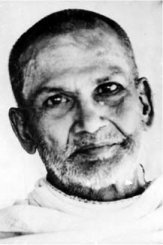
“Know the pure state, your own real nature, by keenly observing the interval between two thoughts.”
–Muruganar, Padamalai, verse 13
“Humility and self-restraint are the marks of those transformed and radiant beings who embody the quality of virtue.”
–Ramana Maharshi, Padamali, verse 26
“To whatever extent mind-consciousness dives within, to that same extent will the bliss of the Self spring forth and reveal itself.”
–Ramana Maharshi, Padamali, verse 26
“The many different religions are appropriate to the maturity of each individual, and all of them are acceptable to reality.”
–Ramana Maharshi, Padamali, verse 4
The post Ramana Maharshi Quotes appeared first on The Spiritual Journey.

